






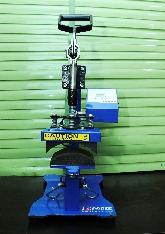



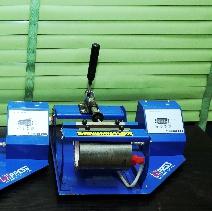







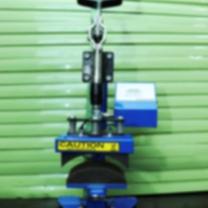









































W thmagazine! Recently, we unveiled our 100 alongside our re inven�on into a wholesome media firm thereby giving us an opportunity to offer more services to our clients and the news from the event is in this edi�on for your happyreading.
e are excited to bring you the 101 issues of our
It is unarguable that Nigeria prin�ng and publishing industry is grappling with issues of local capacity development and Nigeria print jobs remaining in Nigeria but the good news is that concerned stakeholders under the print value chain with the President and Chairman in Council Mr Olugbemi Malomo se�ng the pace for collabora�on with the Federal Ministry of Industry, Trade and Investment, Manufacturers Associa�on of Nigeria, The Lagos Chambers of Commerce and Industry, FIRRO and DCS Integrated Media Limited as the event managers to organise the first Nigeria Interna�onal Pulp and Paper Summit to showcase the poten�als along the paper and pulp value chain as a viable complement to agriculture in terms of employment genera�on, wealth crea�on and Na�onal development. We strongly believe that this collabora�on will birth a new beginning fortheen�reprintvaluechainsectorinNigeria.
We have in this edi�on engaging, educa�ng and business transformingar�cle.
Forconstantupdatesoneventsasitunfoldsinourindustry, visit:www.printersdigest.com.ng
Aboveall,whatyouwillfindinthepagesofPRINTERS DIGESTMAGAZINEisacollectionofwellresearchedarticles writtenbyreal,honestanddown-to-earthfolkswhoworkhard tostayinformedtoenableusgiveyouthebest.Ilovetohear fromyou.Pleasedropmeane-mail (printersdigest@gmail.com)
Precious Ugwuoke-Munachi JOURNALIST ADMIN MANAGER Emmanuel Adedayo


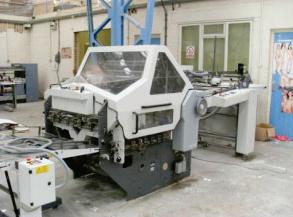



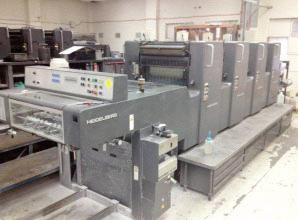






…What makes for a good strategy in a highly uncertain business e n v i r o n m e n t ? F o r b e � e r understanding of the discuss, it is paramount we understand what business uncertainty is. Business uncertainty refers to situa�ons in which businesses face risks that can't be foreseen or measured. During these �mes, it may be hard for businesses to predict their p e r f o r m a n c e d u e t o unprecedented or constantly changing events in their business lifecycle.
The salient ques�on to ask will be how should execu�ves facing great uncertainty decide whether to bet big, hedge, or wait and see? Chances are, tradi�onal strategicplanning processes won't help much. The standard prac�ce is to lay out a vision of future events precise enough to be captured in a discounted-cash-flow analysis. Of course, managers can discuss alterna�ve scenarios and test how sensi�ve their forecasts are to changes in key variables, but the goal of such analysis is o�en to find the most likely outcome and createastrategybasedonit. That approach serves companies well in rela�vely stable business environments. But when there is greater uncertainty about the future, it is at best marginally helpful and at worst downright dangerous.
One danger is that this tradi�onal approach leads execu�ves to view
uncertainty in a binary way to assume that the world is either certain, and therefore open to precise predic�ons about the future, or uncertain, and therefore completely unpredictable. Planning or capital-budge�ng processes that require point forecasts force managers to bury underlying uncertain�es in their cash flows. Such systems clearly push managers to underes�mate uncertainty in order to make a compelling case for theirstrategy.
Underes�ma�ng uncertainty can lead to strategies that neither defend against the threats nor take advantage of the opportuni�es that higher levels of uncertainty may provide. In one of the most colossal underes�ma�ons in business history, Kenneth H Olsen, then president of Digital Equipment Corpora�on, announced in 1977 that “there is no reason for any individual to have a computer in their home.” The explosion in the personal computer market was not inevitable in 1977, but it was certainly within the range of possibili�es that industry experts werediscussingatthe�me.
At the other extreme, assuming that the world is en�rely unpredictable can lead managers to abandon the analy�cal rigor of their tradi�onal planning processes altogether and base their strategic decisions primarilyongutins�nct.
This “just do it” approach to strategy can cause execu�ves to
place misinformed bets on emerging products or markets that result in record write-offs. Those who took the plunge and invested in home banking in the early 1980s immediately come to mind.
Risk-averse managers who think they are in very uncertain environments don't trust their gut ins�ncts and suffer from decision paralysis. They avoid making cri�cal strategic decisions about the products, markets, and technologies they should develop. They focus instead on r e e n g i n e e r i n g , q u a l i t y management, or internal cost reduc�on programs. Although valuable, those programs are not subs�tutesforstrategy
W h at fo l l o ws , t h e n , i s a framework for determining the level of uncertainty surrounding strategic decisions and for tailoring strategy to that uncertainty.
Even the most uncertain business environments contain a lot of s t r a t e g i c a l l y r e l e v a n t informa�on. First, it is o�en possible to iden�fy clear trends, such as market demographics, that can help define poten�al demand for future products or services. Second, there is usually a host of factors that are currently unknown but that are in fact knowable—that could be known iftherightanalysisweredone.

current technologies, elas�ci�es of demand for certain stable categories of products, and compe�tors' capacity expansion plans are variables that are o�en unknown, but not en�rely unknowable.
The uncertainty that remains a�er the best possible analysis has been done is what we call residual uncertainty for example, the outcome of an ongoing regulatory debate or the performance a�ributes of a technology s�ll in development.
Buto�en,quiteabitcanbeknown about even those residual uncertain�es. In prac�ce, we have f o u n d t h a t t h e r e s i d u a l uncertainty facing most strategicdecision makers falls into one of fourbroadlevels:

At level 1, managers can develop a single forecast of the future that is precise enough for strategy development. Although it will be inexact to the degree that all business environments are inherently uncertain, the forecast will be sufficiently narrow to point to a single strategic direc�on. In other words, at level 1, the residual uncertainty is irrelevant tomakingstrategicdecisions.
At level 2, the future can be described as one of a few alternate outcomes, or discrete scenarios. Analysis cannot iden�fy which outcome will occur, although it may help establish probabili�es. Most important, some, if not all, elements of the strategy would change if the outcomewerepredictable.
Many businesses facing major regulatory or legisla�ve change
confront level 2 uncertainty The value of a strategy depends mainly on compe�tors' strategies, and those cannot yet be observed or predicted. For example, in oligopoly markets, such as those for pulp and paper, chemicals, and basic raw materials, the primary uncertainty is o�en compe�tors' plans for expanding capacity: Will they build newplantsornot?
Economies of scale o�en dictate that any plant built would be quite large and would be likely to have a significant impact on industry prices and profitability. Therefore, any one company's decision to build a plant is o�en con�ngent on compe�tors' decisions.
At level 3, a range of poten�al futurescanbeiden�fied.Thatrange is defined by a limited number of key variables, but the actual outcome may lie anywhere along a con�nuum bounded by that range. There are no natural discrete scenarios. As in level 2, some, and possibly all, elements of the strategy would change if the outcomewerepredictable.
Companies in emerging industries orenteringnewgeographicmarkets o�enfacelevel3uncertainty.
Analogous problems exist for companies in fields driven by technological innova�on like our industry The prin�ng and packaging sector When deciding
whether to invest in a new technology, producers can o�en es�mate only a broad range of poten�al cost and performance a�ributes for the technology, and the overall profitability of the investment depends on those a�ributes.
Level4:TrueAmbiguity.
At level 4, mul�ple dimensions of
uncertainty interact to create an environment that is virtually impossible to predict Unlike in level 3 situa�ons, the range of poten�al outcomes cannot be iden�fied, let alone scenarios within that range. It might not even be possible to iden�fy, much less predict, all the relevant variables that will define the future.
Level 4 situa�ons are quite rare, and they tend to migrate toward oneoftheotherlevelsover�me. Those examples illustrate how difficult strategic decisions can be atlevel4,buttheyalsounderscore theirtransitorynature.
Our experience suggests that at least half of all strategy problems fall into levels 2 or 3, while most of the rest are level 1 problems. But execu�ves who think about uncertainty in a binary way tend to treat all strategy problems as if they fell into either level 1 or level 4. And when those execu�ves base their strategies on rigorous analysis, they are most likely to apply the same set of analy�c tools regardless of the level of residualuncertaintytheyface.
Strategy in Level 1's Clear-Enough Future In predictable business environments, most companies are adapters. Analysis is designed to predict an industry's future landscape, and strategy involves making posi�oning choices about whereandhowtocompete.When the underlying analysis is sound, such strategies are by defini�on made up of a series of no-regrets moves.



This is coming a�er many years of public agita�ons from the CIPPON, a regulatory body in charge of regula�ng the affairs of the en�re print value chain in Nigeria on the need for INEC and other government agencies to involve the ins�tute in the prin�ng and produc�on of ballot papers andotherelectoralmaterials.
Recalled that President Muhammed Buhari has signed the amended electoral act, adding that by assen�ng to the bill the burden on ballot papers will be relieved, which the
INEC Chairman, Professor Mahmood Yakubu has also pronounced those electoral materials will be printed locally, but CIPPON agita�ons didn't stop because the pronouncement is not yet Uhuru un�l it is officially announced today as INEC and CIPPON President – Mr. Olugbemi Malomo and some members of the council met INECfordiscussiononareasofcollabora�on.
The points agreed at the collabora�on mee�ng are; officially CIPPON cer�ficate is a criterion for ge�ng jobs from INEC and the highest point was when the commission agreed to allow a window of communica�on saying “this is not just a one-�me mee�ng, you may nowhave our details, please always come in to offer us advice and recommenda�onsasyouwill”.Thecommissionstated.
This achievement for the chartered body is a reaffirma�on that all the agita�ons of CIPPON are gradually yielding posi�ve responses from the government agencies. Recently, at the print stakeholders conference during the 2022 edi�on of the Nigeria Interna�onal Print Expo (NIPEX), CIPPON President, Mr. Malomo during his keynote address said “We are here today to take responsibility, we owe it to ourselves, our future our businesses' sustainability to make prin�ng profitable again in the face of a daily daun�ng challenge We can give up, some certainly will, and we can take responsibility to fight for the sustainabilityofourbusinesses.Ifyou'venoplacetogoand youarereadytoendure�lloursitua�onchanges,then“it'll takeavillagetodothat”Hestated.
He went further to state that “it takes a village to raise a child! So, our ins�tute is saying to their face and not on our status, CIPPON indeed has what it takes to partner with INEC.Ifyouagreespreadthenewseverywherepossible!
The Independent Na�onal Electoral Commission (INEC) has finally endorsed and approved a partnership with the Chartered Ins�tute of Professional Printers of Nigeria (CIPPON) for the prin�ng and produc�on of the 2023 electoralmaterials.The Chartered Ins�tute of Professional Printers of Nigeria (CIPPON) recently co m m e n c e d t h e n a� o nw i d e enumera�on and registra�on exercise in the bid to eradicate nonprofessional printers from the Nigeria prin�ng sector and also to have sta�s�cs prac��oners in the s e c t o r f o r t h e g r o w t h a n d developmentoftheins�tute.


Recently, CIPPON enumera�on team wasattheprin�nghubinOgba Lagos State It was gathered that the na�onwide registra�on started in AbujawhichisnowmovedtoLagosas the commercial city of the country, the registra�on movement was slated for each prin�ng hub in Lagos per day and the city has the widest and biggest prin�ng hub in Nigeria (Shomolu).


According to one of our respondents during the interview session with prac��oners at the enumera�on sites, he said that earlier before the registra�on program commenced, outdoor publicity was executed all around Ogba prin�ng hub, from Yaya Abatan bus stop to Ogba junc�on crea�ng awareness about the ongoing printer's registra�on at Ogba junc�on in other to make the
registra�onprocesseasier.
Our correspondence was able to meet and interview some professional printers at the event. The Vice Chairman of the Associa�on of Prin�ng Prac��oners of Nigeria, Mr Prince Igwe, said: “CIPPON registra�on is a federal thing and not under state opera�on and government, so we are moving to the federal level now, no one can tell where you can be called to come and nego�ate for work, having a CIPPON cer�ficate of membership is going to be another advantage of ge�ng the job. At �mes I asked myself
what is the essence of me being a printer a�er I have suffered many years going to school, graduated, and later end up as a printer and to the fact that printer is now an all-comers profession that novice can just enter the business without any form of restric�on and that's why I don't respondtopeoplecomingtomyshop to find out how to do this and that instead of referring the customers to the professional printers, so it's seriouslyaffec�ngustoday
For instance; if you're not a licensed pharmacistyoucan'topenashopand if you do they'll seal it up. If the CIPPON can take that measure and have professional printers at least I will be proud of being a printer and anyone that want to work will be directed to the core professionals”. I have not really observed the new CIPPON execu�ves but the li�le we have seen and heard recently; I can say they are bringing change to the industry and they're doing be�er than the previous execu�ves” Igwe said
The African Development B a n k G ro u p a n d t h e Secretariat of the African Con�nental Free Trade Area (AfCFTA) have signed a Protocol of Agreement for an $11.24 million support package to enhance the S e c r e t a r i a t ' s e ff e c � v e implementa�on.
The signing took place on 25 July 2022, on the margins of the ninth mee�ng of the AfCFTA Council of Ministers responsible for trade, heldinAccra,Ghana.

The AfCFTA Secretariat, currently in phase II of its implementa�on phase, will benefit from this support package, which aims to boost sustainable intra Africa trade and to augment the number of par�cipa�ng African member states. The funds are intended to move the African trade integra�on agendaforward.
The grant, approved in July by the Board of Directors of the African Development Fund, will focus on t h re e a re a s : i n s� t u � o n a l strengthening of the AfCFTA
Secretariat; private sector support to implement the AfCFTA, and support of climate-resilient regional and con�nental value chains to boostintra-Africatrade.
In addi�on, studies and ini�a�ves will be undertaken to iden�fy new b u s i n e s s a n d e c o n o m i c opportuni�es for women, to help develop the AfCFTA Women and Youth in Trade Protocol, and to support capacity building and targetedbusinessskillsforwomen.
H E Wamkele Mene, Secretary General of the AfCFTA Secretariat signed the agreement on behalf of his organiza�on, while African Development Group Bank Vice P r e s i d e n t f o r R e g i o n a l Development, Integra�on and Business Delivery, Yacine Fal, signed on behalf of Dr. Akinwumi Adesina, p r e s i d e n t o f t h e A f r i c a n DevelopmentBankGroup.
Wamkele Mene said: “We welcome the support of the Bank as this is a clear indica�on of our strategic partnership that will strengthen the capacity of the Secretariat and facilitate the start of commercially meaningful trade under the AfCFTA
preferences. The COVID 19 pandemic and the current geopoli�cal tensions have created an ethos of urgent collec�ve ac�on for the implementa�on of the AfCFTA. We all have a shared responsibility to change the des�nies of all Africans as we achieve the laudable objec�ve of theAfCFTA ”
“The African Development Bank is proud of the strong partnership with the AfCFTA Secretariat and confident that this ins�tu�onal support will help support our respec�ve mandates to spur greater con�nental trade and economic transforma�on, in line with Agenda 2063's vision of the Africa we want,” Fal said. “Africa's hope for building back strong and be�er lies with the successful implementa�onoftheAfCTA.”

ne of the Great Britain
Os c h o l a rs , W i n sto n Churchill, in his quote: “Success is not final; failure is not fatal: It is the courage to con�nue that counts. This affinity can best describe the success story told by the Managing Director of A�ar Prin�ng and publishing company Limited, Dr. Mrs. Adesola Falaiye during an interview session at her office.

Dr Adesola warmly took us through the memory lane of how the company started with a quality for service delivery as their company's driving force. “A�ar is an interna�onal company based in Nigeria. The idea for se�ng up AFKAR is to give people the quality with standard technology that they could get in other advanced countries of the world. When you ask people why they print their jobs overseas? Their response are usually that they cannot find that quality they want in Nigeria. A�ar came in to fill that gap and so far, we have maintained that culture andstandard”
In addi�on, she added that, the idea was to have an expatriate at the helm of the company's affairs and that standard we have maintained �ll date. A�ar was a subsidiary of Vintage Press when w e sta r te d a n d w h e n w e rebranded to A�ar itself with a Bri�sh expatriate Alan Ballard, supported myself with other key management staff. I think they felt we could s�ll uphold the standard, the tradi�on, and the philosophy of the company. I want to believe that I represent the i n t e r n a � o n a l b r a n d , t h e expatriate brand, and what we are looking for in an expatriate brand by God's grace they found it in us
and the tradi�on con�nues. She stated
“I am glad to inform you that the latest technology is what we will promote. We are planning to purchase another new Heidelberg equipment. The first machine that we brought here, we are shipping it to other places whilst we bring in a new machine for finishing. A�ar is a one-stop shop. We try to give our clients everything they want we don'ttakejobsoutsideforpeopleto help us complete it. We try to be self-sufficient”.Dr.Falaiyestated
She went ahead to state that:
“A � a r i s b l e s s e d w i t h t h e workforce, we have the bigger workforce, yes! There will always be Judas out of the twelve but I promise you we fish them out and they either refurbish, reconstruct them or they just go out of the way.
Because the A�ar culture has a contamina�ng nature that when you arehere,you justabideinthat culture, you are eager, you are happily producing great things, things that people will say wow! Things happen in Nigeria and A�ar is a representa�on of the fact that Nigeria has what it takes to compete globally We do a lot with training because God has endowed us with knowledge and intellect in A�ar, and some�mes when we have to pay for training, we do but we don't train blindly, we train to specifica�on, we don't employ blindly, we employ to specifica�on, so if my cousin is looking for a job and he wants me to help I will say, I will employ him where he can fit into that vacancy, 'it's round peg in a round hole' becauseourreputa�onma�ers.
Printers across prin�ng hubs in Lagos have urged government to take a swi� ac�on on the problem of epilep�c power supply and to ensure its adequateregula�ons.

A printer in the prin�ng area of Ogba,Mr.Joshua, chief execu�ve officer of fine print concept described the poor power situa�oninthearea.
He said “it is unfortunate that I have to rely on a generator for running my business and with the high cost of diesel selling at 786/liter things have not been e a s y … I a m b e g g i n g E KO ELECTRICITY DISTRIBUTION
COMPANY(EKEDC)tocometoour rescue by finding solu�on to this problem”
Another printing prac��oner at Shomolu prin�ng area in Lagos Mr. Israel, The Chief execu�ve officer, Best Choice print concept also added that “As someone who resides in Nigeria, I can categorically state that electricity supply in the country is abysmally poor. Unlike our neighbor in Ghana country, has celebrated years of uninterrupted power supply, never has such happenedinthehistoryofNigeria.
“This poor electricity supply has made it extremely difficult to run a print business in Nigeria, it's appalling that a country that calls itself 'giant of Africa is s�ll ravaged with the epilep�c power and that is why print a major challenges with the sector and we rely heavily reliantonself-generatedpower”


Further more , he stated that a first
�me visitor to Shomolu will be welcomed by a deafening noise f ro m ge n e rato rs s o u n d s everywhere.
He said added that power supply has cripple most businesses and also comes with environmental costs The constant use of generators that emits fumes into the atmosphere, increases air pollu�on which affects climate changeand human health.In turn, environmental damage can result in agricultural job losses, the rippleeffectsarecountless.

The Chartered Ins�tute of Professional Printers of Nigeria (CIPPON), in collabora�on with the Federal Ministry of Industry Trade and Investment, Manufacturers Associa�on of Nigeria (MAN), and the Lagos State Chambers of Commerce and Industry (LCCI) have announced the official date for the first Pulp and Paper Summit scheduled to hold from October 17 -19, 2022at the Abuja Sheratonhotel,Abuja.


In an official statement to the media, the ins�tute stated that the essence of the summit is to bridge the gap in local pulp and paper produc�on in Nigeria, showcasetheviabilityofthepaper and pulp value chain, and also to create stakeholders in an all inclusive policy that will make growth and investment possible with the theme of the summit: Bridging The Gap In Local Pulp And PaperProduc�oninNigeria”
“The Nigerian Paper and Pulp


summit is set to change the narra�ves of import dependence and to showcase the poten�al in the paper and pulp value chain as a viablecomplementto agriculturein terms of employment genera�on, wealth crea�on, and Na�onal development”. The statement reads.
According to the release, the summit will serve as a point of convergence for stakeholders in Nigeria's paper and pulp value chain and fashion a holis�c approach to understanding the challenges of the pulp and paper valuechain.
newpapermills”.
C I P P O N a d d e d : “ B e h i n d hundreds of commonly used paper products like board boxes, p a p e r b a g s , e n v e l o p e s , notebooks, the roll of toilet papers, diapers, newspapers, magazines or books, there are a whole chain of companies genera�ng employment and wealth through the pulp and paper sector Nigeria imports an es�mated 3 0 million metric tonnes of paper and pulp for its consump�on. This is cos�ng the na�on over 3 billion dollars in value. Can Nigeria save this fund or a percentage of it? The statementinquired.
Manufacturers Associa�on of N
ge

MAN
Lagos State Chambers of Commerce and Industry (LCCI), and others will be part of the solu�on to our paper problems and also help the federal government reduce the pressure on dollars by recommenda�ons that will either help revamp our mills or give birth to investment in

CIPPON IN COLLABORATION WITH FEDERAL MINISTRY INDUSTRY TRADE AND INVESTMENT, MAN AND LCCI SET TO HOST FIRST NIGERIA INTERNATIONAL PULP AND PAPER SUMMIT 2022
The poten�al of Nigeria's prin�ng industry as a lucra�ve and profitable sector is being undermined by the heavyincreaseofproduc�on costs and the import dependent situa�on of the sector among otherissues.
As a result, these limits the s i g n i fi c a n t i m p a c t a n d contribu�on the industry could be makingtogrowtheeconomy.
This was gathered during a faceto face interview with printers
Lagos, where printers were able to speak out their mind about the challenges facing their businesses from�meto�me.
Tiamiyu Samad, chief execu�ve officer, concept print and synergy industry, said the industry is largely import dependent as 90% of the materials and machines used are sourcedfromabroad.
you need to clear the materials in Apapa is equivalent to the amount youboughtthematerials,”hesaid.


A u g u s� n e R a p h a e l , c h i ef execu�ve officer, perfect impact print located at Ogba prin�ng hub also sh d more light on the heavy d e p e n d e n c e o n m a t e r i a l importa�on affec�ng Nigeria prin�ngindustry.
around different prin�ng hubs in
“Mostoftheprin�ngmaterialsused areimportedfromforeigncountries especially China and when you finally gets to contribute money to purchase the materials or machine , you'll then realize that the money
“The importa�on dependence is wo rs e n e d b y t h e c u r re nt exchange rate and has made it so difficult for businesses to bring in product easily“, he further said that paper mills in Nigeria are not func�oning in full capacity and paper is a crucial part of produc�on.
Raphel went ahead to urged the g o v e r n m e n t t o p r i o r i � ze resuscita�ng those moribund paper mills in Nigeria, which will t r e m e n d o u s l y r e d u c e dependence on importa�on for produc�on ac�vi�es, Apapa clearing fee should also be considerate.
Federal Government of Nigeria has approved zero i m p o r t d u � e s o n a l l imported prin�ng equipment into the country by the Chartered Ins�tuteofProfessionalPrintersof Nigeria's (CIPPON) licensed prin�ngequipmentdealers.

The good news from the Chartered body – CIPPON came as a relief to the prin�ng equipment dealers, who yearningforthehighcostoftariffon import duty has caused the sky
rocking of equipment cost, thereby affec�ng the final cost of print produc�on.
This informa�on was made available by the ins�tute to equipment dealers on Printers' social media pla�orms across the country In an official statement by the council secretary, Mr Akin Oduwole, he said: “CIPPON advocacy work has yielded a great result. All prin�ng equipment dealers that wish to benefit from these zero import du�es should contact the secretariattoprocesstheirlicenses”.
Reac�ng to the news, the Chairman of Yaliam Press, Alhaji Yahaya Amfanisaid:“Greatjobandtheway to go CIPPON!!! Weldon to the president, Mr. Olugbemi Malomo, his execu�ves, and the en�re council members, including those who worked to achieve these historic achievements. We are making progress despite some challenges we hope and pray to overcome soonest, united we stand to gain more from the federal and stategovernments”Hestated
Prin�ng isn't dying; its improving… this statement was made by Augus�ne Raphael, chief execu�ve officer of perfect impact print, ogba Lagos, in a recent interview stated that the volume of materials being printed isn't falling, it is actually rising. Half a century later, prin�ng is s�ll not on its way out, but its changing as digi�za�on is disrup�ng many print industries, including publishing, people now absorb their newspapers and booksonline.
He said further that, digital prin�ng is a 21st century technologyandprintoperatorsare inves�ng in digital infrastructure, such as servers and worksta�ons, because of the advantage over litho presses. More informa�on is being converted and exchanged in
digital formats, such as email and online forms, which means the demands on printers are changing.
Big runs are giving ways to smaller ones and very small produc�on schedules are been demanded, awhich reduces the �me vailable for offsiteprintfinishing.
"Top of the line is that digital prin�ng reduces print shop costs by up to 30%; that's more than the typicalmarginonmostjobs”

"Itincreasesjobspeedbyupto50%, so printers can respond more rapidlytocustomerrequirements”
"It is infinitely more flexible, crucial in achieving variable data outputs and, with finishing built in to digital printers, and it allows complete jobs to roll off one machine, in-house, with no addi�onal handling required. Even though more
informa�on is going digital, it doesn't mean less work for printers"
"So it is good to say that the emergence of digital resuscitates dying print business". However, the volume of output is con�nuing to grow substan�ally it just the type of job that is changing, with a demand for smaller individual jobs.
He then concluded that, digital prin�ng is the way to the futurenot because litho prin�ng is bad, but because the future demands flexibility, speed and lower costs, he also implores printers across Nigeria to always keep updated to thechangesinprintindustry.
'PRINTING ISN'T DYING; IT'S IMPROVING' SAYS AUGUSTINE RAPHAEL
“ASSPPON Ogba is the only print associa�on recognized by Lagos state government, Mushin and Shomolu are not recognized” … this statement was made by Mr Sepkene Godfrey Ochiemen, the former Vice Chairman of the Associa�on of Prin�ng Prac��oners of Nigeria, Ogba branch of the associa�on during an interview session with the Printers Digest magazineattheCharteredIns�tuteof Professional Printers of Nigeria (CIPPON) Na�onwide printers' enumera�on and registra�on exerciseatOgbaareaofLagosState.
Sepkene commended CIPPON president, Mr. Olugbemi Malomo's lead administra�on, and the council members for the exercise which he said came late but be�er late than never.

Headded,“ifthey'vestartedearly,they would have been able to redefine the system and bring out the real professional printers, but it's be�er late than never. We can see the present council impact, and the membership registra�on exercise will help to tackle the challenges facing the prin�ng i n d u st r y t h e re by e ra d i ca� n g nonprofessional printers from our sector More jobs will start come to the professionals as against what we currently have where everyone is a printerinNigeria,peoplewalkuptothe office and speak their normal language to get the job, I might do the job anyhow because of the paltry sum of money I'm going to collect for the job, I might do the job anyhow, so efficiency andqualitywillbelost”.
Sekpene went ahead to express his dissa�sfac�on over the defunct CIPPON council that he paid for registra�on and was never issued his cer�ficatetodate.
He also added that the CIPPON strategic compliance with the government to ensure that printers must present their license before any printer could be offered a job is a great idea for the industry, the reason is that the �me will come for that license will be an avenue for them to access the enablement of prin�ng in Nigeria



because as at now they cannot really access the development and the equipment of prin�ng in Nigeria but whenthecoreprofessionalsareintoit now they'll be able to see prin�ng as a professionandasabusiness.
Advising the current CIPPON council, he encouraged them to put more effort and more commitment to the already great work they are doing. He said: “The Ogba branch of ASSPPON is a stakeholder in the Nigerian prin�ng industry. It is not Shomolu and Mushin as the majority claimed.
ASSPPON Ogba is the only print associa�on that is recognized by the Lagos State government, and Mushin and Shomolu aren't recognized. We went through some processes to achieve this registra�on, that's why Lagos state government can give our members loan close to 400,000 Naira”
“OGBA ASSPPON IS THE ONLY PRINT ASSOCIATION RECOGNIZED BY LAGOS STATE GOVERNMENT” ASSPPON 1ST VICE SAYS

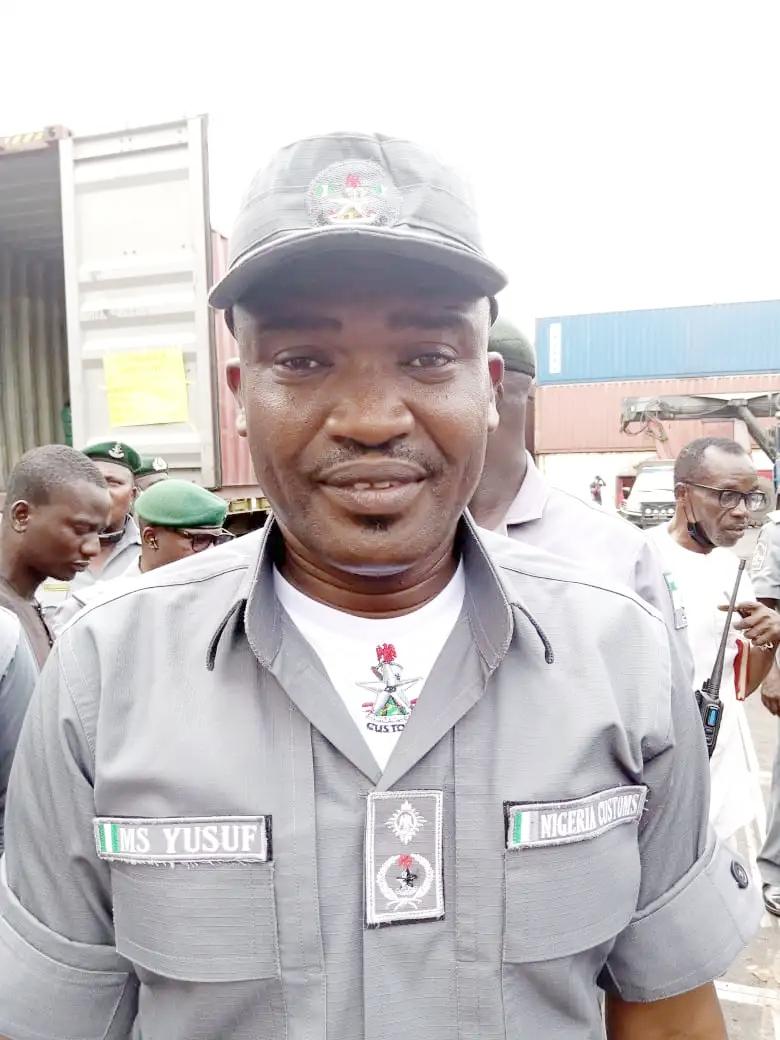

Skysat Technologies, the sole representa�ve of Konica Minolta and Brother office documenta�on and labeling solu�ons in Nigeria, on Thursday launched its latest brand of printer Ink Tank printer series –Inkcredible with improved print speeds, cost efficiency, and mobile connec�vity at Eko Hotel and Suites Victoria Island, Lagos, Nigeria.
In an opening speech, the Managing Director of Skysat Technologies Limited, Mr. Izzat Debs said: ” A few years ago, in conjunc�on with Brother we i n t r o d u c e d t h e I n k Ta n k technology for printers into the Nigerian market, this concept is designed to lower prin�ng costs

and increase produc�vity without compromising the quality of your print. This ini�a�ve further increased the market share of Brother Printers in the office and homeprinterssectorinNigeria”.
“Today, we are set to blaze the trail
again with the official launching of the new Brother Ink Tank Printers series. The new Brother Ink Tank Printer uses a plug and play technology that makes it easy to install and use. It also makes prin�ng more cost-effec�ve and affordable. A major highlight of this product launch is to up-skill our merchandisers across Nigeria on to how to use and sell these new printers and other products in the stable of Brother This ini�a�ve will further equip our merchandisers and dealers to grow the market share of Brother productsinNigeria”Izzatstated.
Moreso, the Managing Director of Brother Interna�onal Kennosuke Hirano described Brother printer as Japanese excellence for over 100 years. “Good for business, black colour comes out with a

superior quality print run, compact, reliable and affordable,” Hiranosaid.
During the presenta�on at the launch, the Manager/sales director the Middle East and Africa Mohammed Noor stated that Brother is a market leader in the Ink tank printers and with this new line of the ink tank, he said: Our unique specifica�ons are unequal to other brands Incredible savings and trusted Design The wireless Brother DCP T420W Ink Tank Printer3-in-1featuresatransparent cover that allows for easy front access to the embedded ink tank. The user friendly design is engineered to minimise the risk of messandleakage.

The DCP-T420W is plug and play, you can use it straight out of the box without any driver installa�on Connect the printer to your PC
wirelessly or with the USB cable included in the box. Print from anywhere with the built in Wi Fi, allowing your en�re home or office to share one device effortlessly. He explained.
He added, “The wireless DCP-T420W Ink Tank Printer 3 in 1 has been designed to lower prin�ng costs and increase produc�vity without compromising the quality of your prints. Featuring a one-touch Copy Shortcut key, you can quickly access commonly-used copy func�ons to save �me and increase your produc�vity. Expand your print capabili�es with the professional quality that yields crisp, clear text and vibrant graphics. Lower your cost per print with ultra high-yield ink bo�les with yields up to 7500 pages* black and5000pages*percolour
Brother's Ink Tank Printer Series features a transparent cover that allows for easy front access to the embedded ink tank. Our smart design features a new hands-free refill bo�le to enhance user experience to minimise the risk of mess and leakage.
Our Ink Tank printers offer unique colour enhancement designed to


op�mise your colour prints with true to life colours Dye inks will provide you with sharp text prin�ng on standard paper as well as excellent photo print quality” Noor stated.
He went ahead to state that the brand payoff speaks for the brand –Brother at your side. “Yes, we believe in long live rela�onships with our customers and we always place our customers first. Nigerians are smart business people, they should understand the profit is and that is why they should add one important feather to their cap and that important feather is the Brother Ink Tank printer Noor added.
Risa Hamatsuki, the deputy general manager of the planning division of Brother Interna�onal in her presenta�on at the launch spoke on the brand uniqueness and key Features as follows: Print, Copy, Scan, Wireless connec�vity, Print speeds of up to 16/9 ipm (ISO), 150 Sheet paper input, Manual feed slot, LED display, Mobile and email print capable, iPrint&Scan for Desktop and Mobile, Free 5 year*/30,000 Page Carry in Warranty, this according to Hamatsuki stands the brand out amongothers.


Limited recently held its first series of open house tagged MDD - MEET, DRINK, and DEMO carnival at the company's head office in Alaka Estate, SurulereLagos,Nigeria.




The open house was spiced with several inspira�onal crea�ve ideas displayed in the gallery to help revive the love for tex�le prin�ng through Direct-to-garment (DTG) and Direct-to-fabric (DTF) and the possibili�es in crea�vity and profitability in the tex�le prin�ng businessinNigeria.


house was designed in quite an inspira�onal manner with different crea�ve ideas of how the DTG and DTF can be used to create a beau�ful piece of art as seen on display, and this notwithstanding has set a pace for DTG and DTF prin�ng in Nigeria as a guest at the event during an interview session on the event revealed how inspired they were with the level of crea�vityshowcasedattheevent.
The similarity and differences between DTG and DTF were part of the highpoint of the showcase with expert advice on how to be profitable in the tex�le prin�ng businessinNigeria.


According to the Chief Execu�ve Officer of KSBC Interna�onal Venture, Mrs. Emily Emodi, she said “the event is an interes�ng o n e , e y e o p e n i n g , n e w opportuni�es and it's �me well spent. We have their equipment already, what we need from them is the configura�on to be able to do DTF and DTG and the other thing that one can do with DTG thatwasexplainedtoday”
In addi�on, she stated that tex�le prin�ng in Nigeria is quite interes�ng, and rewarding financially and the market is large because most of our people abroad like doing their thing here

because it's cheaper, so with that we earn money from them, some pay well and some don't. it's fine a n d t h e r e a r e a l o t o f opportuni�es in the tex�le market. Impor�ng right now is not easy, so I'm sure everybody is looking inward, to source materialslocally.
According to Mr. Akin Oduwole, the Managing Director of Technology Global limited and the convener of the event, he said:
and brought DTG to Nigeria a few years ago, and what we realized is that some people come in and go out of business. Their complaints are most �me Dtg is not profitable but the truth is no DTG can be profitable if approached in the right way.
“Events for us is a way of giving back to the society and basically challenged with the kind of environment we are in where people don't take �me to get enough educa�on. I'm talking about educa�on even in the informal way and many �mes, what we see is that people don't getenougheduca�on”
“This kind of open house is to educate, to bring the best out of every situa�on we can see, par�cularly for DTG. We ini�ated
Here's a genera�on Z, and they're the genera�on who drive DTG prin�ng, they have brands, when I was in the university and my mother's health started failing, I could remember telling her that she shouldn't bother about me, and then I did start hustling, in our own �me I'll write programs and make money from it because I was studying a lot of things that have to do with technology, so I write programs and sell to people and we were hustling in school and making money and obviously, these guys a r e a l s o d o i n g t h a t b u t unfortunately, they're not in school, I mean ASUU has been on strike, it's not poli�cal but am just trying to make a point, so they're not in school, they're ge�ng more and more crea�ve to be able to survive, some of them have created brands and you'll be amazed that they're selling products abroad, so if DTG is working in abroad why won't it workshere”Hestated.
He said further that “this event is the cumula�ve work we've done in the past on why is it not succeeding here and succeeding over there, and then we've taken a lot of case study and with that, we've brought in here a gallery, for instance, we have a gallery of EJIMA that speaks about twin, so we can actually print DTG/DTF and it's a case of beauty in the eyes of the beholder, one comes out glossy another comes out ma�e, which some people may
prefer DTG and some may prefer DTF, really there's no different, you can expand the augment of business you're doing by crea�ng op�ons with your DTG and people didn't know this before, so you can have a DTG that can print both D T G , D T F t h e y h a v e t h e advantages, although every technology has advantages and disadvantages, for example, DTF is cheaper so if a customer comes to me and say he can't do the work because it's expensive, there's a possible op�on of the cheaper one(DTF)”
“We also use the sports market, for instance, 'ALEX' here is a basketballer and this can also be any sport, by the way, sport is a big market we've underes�mated, so we're saying that people can now print on polyester using DTG and how can it be done, we say ask the expert, that's why we are here so thatwecanshowyouhowtodoit. Let us take schools' inter-house sports for instance, and you know everyschoolprintsforinter-house sports, so you can just meet the students and ask them what club they are in, so you can print a T shirt that looks like MAN-U, and it mo�vates the guys and they become more interested in sport, that's the way to do it in this business”Oduwoleemphasized
Moreso, he said: “I think people coming in here can pick up these li�le crea�ve ideas, merge it together into their business to reformtheirbusinessandmakesit more profitable DTG can be profitable, I know companies abroad who just have a DTG machine and they make a living outofit.Sothat'swhatwewantto diffuseheretoday

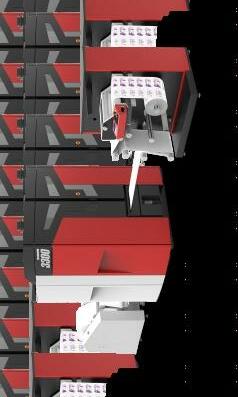
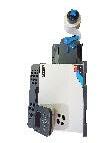

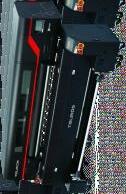





It was a triple celebra�on as DCS Integrated Media limited, a leading media, marke�ng, e v e n t m a n a g e m e n t a n d consul�ng firm in the Nigeria prin�ng sector reinvent into a wholesome Media, Marke�ng a n d Ev e n t s m a n a g e m e n t company, to service the en�re sectoroftheeconomy.

T h e r e c e n t l y c e l e b r a t e d reinven�on ceremony at Lagos Sheraton Hotel, tagged Reimagined and Reinvented had the unveiling of the company's flagship Printers Digest Magazine 100th edi�on alongside a business luncheon for the Managing Directors and Chief Execu�ve Officers of companies in Nigeria.
the standard of prin�ng business in Nigeria. Since then, we have been responsible for suppor�ng many print businesses to create awareness and grow their market share and business in the Nigeria prin�ng industry.Goingforward,we have decided to leverage on the extensive experience we have gained in providing media rela�ons services through our publica�ons like Printers Digest and marke�ng communica�ons events like NIPEX by reinven�ng our business to a wholesome media rela�ons, marke�ng and events management company

exhibi�on and our services will now also be extended to all s e c t o r s o f t h e l o c a l a n d interna�onal community” Mr Obokhaistated.
The guest speaker at the Business Luncheon �tled: Reinven�ng your business for profitability, Dr. Dolapo Tukuru the Chief Execu�ve Officer of Eduxtra Solu�ons Limited, said most business owners don't have the capability to use data to their advantage and that is a big problem. Tukuru said: “We need to start thinking about how to use data to our advantage as business exe c u � v e s , a ny c o m p a ny designed for success must innovate.
Most companies are afraid of making mistakes, most businesses we have today was born out of scarcity mindset, what we have today is abundance of mindset. I remember when growing up, every Christmas we go for exposure and we are very careful with every picture we take as it is minus one but today, you can take as many pictures as possible and upload all on Instagram without restric�on on the number of pictures you can post – that is abundantmindset”.Hesaid.
According to the Chief Execu�ve Officer and Managing Director of the company, Mr. Tunde Obokhai in his opening speech said: “For more than two decades we have been providing innova�ve marke�ng and management consultancy solu�ons for upli�ing

We shall be offering a full suite of cu�ng edge services which will include publica�ons, brand awareness, print, digital, social media, public rela�ons, and media and communica�ons training ser vices, corporate events management, product launches,
Tukuru added: “Many of us wants to innovate but there is culture that resist innova�on, as a ma�er of fact, nobody pays anyone for innova�ng, but they pay people for their jobs. Nobody wants to disrupt their own growth. We are going to be reinven�ng ourselves for profitability. We are busy with opera�ons without pu�ng �me out for strategic frameworks to innovate. Most business find it
difficult to transform, if we don't transform or reinvent, how do we make progress in our business?” Heinquired.
The Chairman of the advisory board of DCS Integrated Media Limited, Dr. Ro�mi Oladele during his speech assured the company of his team unwavering support, he said: “We are going to build synergy, draw ac�on plan, create linkages and also influence role assignmentastheadvisoryboardofthecompany”.

Furthermore, the president of the Chartered Ins�tute


of Professional Printers of Nigeria (CIPPON), Mr. Olugbemi Malomo at the luncheon called on his colleagues to support the company in their line of business, he said: “Let us celebrate our own. DCS Integrated Media have laid a good founda�on of pioneering in this industry and a lot of people have benefited from what we do in the Nigeria prin�ng industry through this company locally and at the interna�onalscene”.




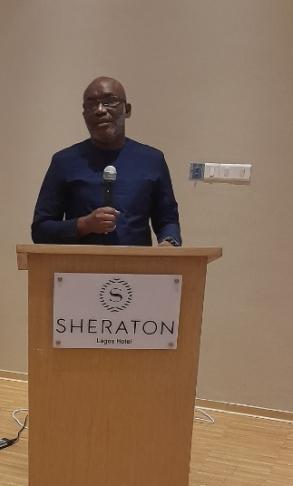








The Nigeria printing industry is one of the less recognized but lucrative industries within the Nigerian economy.Oneofthebigreasonfor


this non recogni�on is the increasing growth of SMEs(small and medium-sized enterprises) and the amount of compe��on between exis�ng brands, the
upcoming ones and the rela�vely new brands. This compe��on has spurred the need for producers and marketers to ba�le for the a�en�on of both poten�al and exis�ng consumers to growtheir brandequityinthemarket.
In the face of the dwindling oil fortunes, the prin�ng industry is one of the industry the Nigerian government should look into, by way of providing financial capital through loans and grants. My take on this is that the commercial prin�ng industry is one of the largest informal sectors employing millionsof youths and one of the largest employers of labors in Nigeria.
However, the quest for the colossal look to the emergence of various prin�ng hubs in Nigeria brings about this ques�on:
Aside Shomolu and Mushin, Lagosthatarelargelyrecognized as the two foremost commercial prin�ng hubs in Nigeria, are there any other within Lagos andoutside?
According to research carried out, it's of no doubt, both Shomolu and Mushin are two p o p u l a r l y r e c o g n i z e d commercial prin�ng hubs in Lagos , perhaps, the whole of Nigeria. While Shomolu is known to harbor clusters of commercial prin�ng specialists
A COLOSSAL LOOK AT THE EMERGENCE OF THE VARIOUS PRINTING HUBS IN NIGERIA AND ITS EFFECT ON CAPACITY DEVELOPMENT IN NIGERIA PRINTING INDUSTRY
than anywhere else in the country, Mushin is the home for prin�ng materials and consumables. Aside Shomolu and Mushin, we have other fast-growing commercial prin�ng hub in Ogba, Yabba and ijaiye ojokoro area, Lagos. Outside Lagos we have a popular commercial prin�ng hub somewhere in Mokola Ibadan ,also area in Ogun state, FCT Abuja and in Benin city, Edo state With this, I can tell you categorically that Shomolu is the home of commercial prin�nginwestAfrica.
A prin�ng community has gradually evolved at Area 7 over the last few decades. The area, popularly known as UTC (United Training Company),actually derived its nicknamefromthehistoryoftheprin�nghub. It was gathered that the chairman of the printer's associa�on, Mr Gabriel Adediji gives a detailed explana�on of the emergence of Abuja prin�ng hub, he said when the government built a large space with roofs and began construc�ng shops, the vision was for a trading spot where a day to day food items would be sold , but certain factors influenced the domina�on of the complex by printers , he said from the 1990s, the united trading company, popular in places like Ibadan and Lagos, were also in the complexbutwhentheyle�,people never stopped calling the complex and indeed the whole area 'UTC' butitsoriginalnameiszone7shoppingcomplex.
Hesaidfurtherthat,“themarkethadbeenexis�ngfor long but it was not known that much un�l printers came and dominated it. It began to be known as a place for printers as far back as 1998,1999, when they startedopeningshopshere.Thereweresomeskeletal prin�ng being done before the �me, but from 1998 it becameknownasahubforprinters.

Ibadan the capital of Oyo state, generally known as the largest city in Nigeria and west Africa with Ibadan north as one of its 33 local government areas. Ibadan
north local government is endowed with a very large popula�on and has a lot of poten�als for industrial concerns.
Mokola prin�ng hubs is distributed in a clustered manner over the area, as almost every building on Mokola hill has at least a prin�ng press in it as observed. The three most important loca�on factors that necessitates the emergence of Mokola prin�ng hub are: accessibility, nearness to market and available of land or premises. Meanwhile, prin�ng industry in Mokola area is grossly faced with the problemofpoorelectricitysupply
It was also gathered that some specific factors were iden�fied as having influence on the loca�on prin�ng
press in Mokola area. These factors include nearness to sources of raw materials; it was gathered that majority of the printers in Mokola area obtain their raw materials from Mokola, Oke ado and Ogunpa areas of Ibadan. These loca�ons are all close to the loca�onofp prin�ng industries in Mokola area. The highest number of kilometers travelled in the bid to obtain raw materials for the produc�on process is about(3) kilometers The raw materials obtained include paper, ink, toner, chase, kerosene, diesel and petrol.
Firstinnova�onhubinAbeokuta,Ogunstate Grazac technology limited, one of the leading so�ware companies in Ogun state has launched the first innova�on hub in Abeokuta, the state capital.
Crea�ve's, entrepreneurs, strategic thinkers and tech enthusiasts converged on the located along Sam Ewang Estate road during the official launch on Friday,November132021.
Chairman, ogun state prin�ng c o r p o ra � o n , s o l a o t e s i l e highlighted the effect, impact and importance of the emergence of this hub on capacity development in the state prin�ng industry and Nigeria prin�ng industry at large, as a source of employment opportuni�es for the youth especially in an era where white collar jobs are gradually becoming vague.
S O M O LU i n s o m o l u l o c a l government area of Lagos state is unarguably the hub of the commercial prin�ng in Nigeria with the thousands of commercial prin�ng presses both small and medium scales do�ng the length and breadth of this burs�ng business community although her posi�on in Africa and indeed the world as bone of the leading enclaves of prin�ng business
remains a subject of debate, not a few stakeholders in the Nigeria prin�ng industry are of the opinion t h a t s o m o l u c o m m a n d s a respectable posi�on in league of leading prin�ng communi�es not onlyi9nAfricabutalsointheworld.
Possible effect of the emergence of various prin�ng hub on capacity development in Nigeria prin�ng industry
The concept of printers coming together to dominate a par�cular area, strictly meant for printers and comprising shops where various prin�ng related ac�vi�es are carried out (hub),thus has a great impact and effect on resolu�ng the failure of Nigeria prin�ng industry by establishing uniformity and enabling prin�ng industry to be relevant as other industries in Nigeria.

However, the emergence of various prin�ng industry both old and different newly discovered prin�ng hubs in Nigeria is one way or the other preven�ng one of the major short-comings that is making the prin�ng industry to be very
irrelevant in Nigeria which is that the prac��oners failed to come together as a unified associa�on. All we have are disjointed associa�on sca�ered all over have failed to the country we know that building a strong ins�tu�on is thepanaceatovirileindustry
An a�empt to do this was the struggle to have a cha�ered body which came to an existence in 2007 This ins�tu�on was bedeviled by internal crisis from the onset orchestrated by 'NIGERIAN FACTOR' that never wanted the industry to be regulated The ins�tute a�er 15years of existence cannot be called an ins�tute but mere associa�on been managed through whims and caprices of s e l e c te d a n d a d va nta ge d entrepreneurswhoareengagedin prin�ng business but most of t h e m a r e f r o m d i ff e r e n t professions without further trainings in prin�ng technology and management This simple factor is the cause of premature windingofprin�ngestablishment




 -Akin Oduwole
-Akin Oduwole

Mr. Akin Oduwole, the Managing Director of Technology Global limitedhasrevealedandshedlight on the appropriate ways to approach DTG to be profitable in Nigeria.
He made it known in an interview session with our correspondence th on the 30 of august 2022 at Technology Global MEET, DRINK ANDDEMOOpenhousecarnival.
An excerpt from a face to face interviewwithTechnologyGlogal Boss,Mr.AkinOduwole
Q: As the convener of this event, telluswhatyouhadinmindwhen youputthistogether?
A: event for us is a way of paying back to the society and basically c h a l l e n g e t o t h e k i n d o f environment we are is that people don't take �me to get enough educa�on, formal educa�on in this aspect is not just it, I'm talking about educa�on even in the informal way and many �mes, what we see is that people don't get enougheduca�on.
This kind of open house is to educate, to bring the best out of every situa�on that we can see, and par�cularly for DTG, if you could remember, we ini�ated and brought DTG to Nigeria few years back, about 7/8 years ago and what werealizeisthatsomepeoplecome in and go out of the business and the complaint most of the �me is
'oh it's not making money' no DTG can make money but we don't approach it the same way we approach a conven�onal offset prin�ng for example, we have to approach it differently, there's a genera�on a�er the Gen Z and they're the genera�on who drive DTG prin�ng, they have brands, when I was in the university and my mom cell beginning to fail, I could remember telling my mom that she shouldn't bothers about me and then I did started hustling, in our own �me I'll write programs andmakemoneyfromit,becauseI was studying a lot of thing that has to do with tech, so I write programs and sell to people, so we were hustling in school and making money and obviously this guys are also doing that but
unfortunately they're not in school, I mean ASUU has been on strike, it's not poli�cal but am just trying to make a point, so they're not in school, they've idle �me, they're ge�ng more and more crea�ve to be able to survive, some of them have created brands and you'll be amaze that they're selling products abroad, so if DTG is working in abroad why won't it works here, this event is the cumula�ve work we've done in the past on why is it not succeeding here and succeeding over there, and then we've taken a lot of case study and with that we've brought in here a gallery, for instance we've a gallery of EJIMA that speaks about twin, so we can actually print DTG/DTF and it's a case of beauty in the eye of the builder, one comes out glossy another comes out ma�e, which some people may prefer DTG and some may prefer DTF, really there's no different, you can expand the augment of business you're doing by crea�ng op�ons with your DTG and people didn't know this before, so you can have a DTG that can print both DTG,DTF they've the advantages, although every technology has advantages and disadvantages, for example DTF is cheaper so if a customer comes to me and say he can't do the work because it's expensive, there's a possible op�onofthecheaperone(DTF).
We also use the sport market, for instance 'ALEX' here is a basketballer and this can also be any sport, by the way sport is a big market we've underes�mate, so we're saying that people can now print on polyester using DTG and how can it be done, we say ask the expert, that's why we are here so that we can show
you how to do it and go out there and this to schools for inter-house sports and you know every school print for inter-house sport, so you can just meet the students and ask them which club are you, you know all those li�le kids knows about sports too especially football and he says I'm a Manchester united fan by the way MAN U for life, so you can print a t-shirt that looks like man-u own, it mo�vates the guys and they become more interested in sport, that's the way to do it.
We can create this business it's like a poll marke�ng, we've to poll the business in ourselves, we don't just keepwai�ngthatthere'snobusiness,we'vetouseour crea�vity to bring in business and crea�vity is what 'DADA' is showing us, DADA here is that guy with dreadlocks, gi�ed guys, I have a lot of them as friend, they're very healthy and strong, trying to use DADA to communicate that everyone that tends to use DTG mustmakesuretheyengagethecrea�vity.
DADA is a musician at some point, he also does pain�ng and he has moved from using his hand to using DTG, all drawings shown are done with DTG, especially the 60x70 which is a big size and this is a new DTG that is out from bollyprint we called it the NA series, its already been used in Europe we just want to wait and see how it works in Europe before we introduceithere.
The best of it is the OGEDENGBE family, where the husband is a Warri man and the wife is a Lagosian, everything they wore is DTG printed and it is more than t-shirt prin�ng. I think people coming in here can pick up these li�le crea�ve ideas, merge it together into their business to reform their business and makes it more profitable. DTG can be profitable, I know companies abroad who just have a DTG machine and they make a living out of it. So that's what we want to diffuse here, that feelings that DTG is not profitable, of courseitisprofitable,it'sthewayweapproachit,have cha�ed with few people who have come here today and I could see those people are very inspired, this is just the beginning of the series we've a lot more of MEET,DRINK AND DEMO where we'll be showing other things, other businesses, as you know prin�ng is so wide we've to take it in segment and we see how it goes.
A: we've polyprint shortee, we've a shortee and at the back of it is echo, echo is A2 size, shortee is A3 size, if

Q:canyoutalkaboutthemachinesyou'vehere,their namesandwhattheycando?
you're buying this brand new today, we've echo2 and shorrty2 , so we've all that but if you look into the video up there that's the new model of the Nseries, it's be�er vibrancy, faster machine, cause I heard a lot of people complaining about the speed of the current machine, they've to wait while they print, the idea of this is for you to start so that you don't start and lose money, you start and grow the volume, so the new machine is to pump up your volume, some people who had thismachineforawhilecanaswell move up to the next volume instead of buying a second machine, you can buy a bigger machine that is faster and more vibrant by the way that machine is purely a polyprint machine and people ask us why do we work with polyprint, it is because they focus on DTG prin�ng, nothing else.
Nowthey have a machine that was built from scratch by them, in the past they get some parts from others to build theirs but this is totally built by polyprint because of the years of experience they've hadinpolyprint.WiththisIbelieve the sky is the limit for tex�le prin�ng.

Q: which country is the machine
A:polyprintisfromGreece
A: if you knowthe history of Greece, you'll know that Greece is the home of tex�le prin�ng and if you understand the way we operate here, we want equipment that will work in Nigeria because it's not all equipment that'll work, in choosing which DTG to go for, we did a lot of research even had to go to Greece and we discover that this guys are not doing anything else than DTG, we can see that they're focused, that is why even during pandemic and all we s�ll see polyprint producing a new machine and ge�ngitintoanewrela�onship.
Now they've ink of their own which means that cost of ink could come down and it can only get be�er, this iswhywechoosepolyprint.

Working with them for about 8 years now you can call up this people any�me and they'll respond, and for us support is always key because this is our own selling point, everybody knows us for good a�er sales support, any supplier we're working with too, once we can get good support from them too, we're always sa�sfied, so polyprintisthewaytogo.
A: this is a discussion I just had with one of the people who came and she's trying to complain that exchange rate is rising, let me shock you, it'll keeps going up because we produce nothing, we're totally export depending country Our earnings are from oil and as it is we don't have refinery, we take our crude oil out and use this expensive FOREX to buy in product as long as that is in place there's no solu�on to the high exchange rate, it'll keep going up and again once exchange rate goes up the price of everything will also high, so the infla�on we can'tdoanythingaboutorIshould putitintwodifferentways.
One is to leave everything and fold and our hands and wait which at the end of the way to me looks wretched or the other is to start taking baby steps with the hope that by the next elec�on we'll get new set of leaders who will move things in a direc�on that could favors the country and in the main �me what I think we should do is to take the baby step and that's thewaytogo.
People asked me the right �me to invest, I say this is the right �me to invest if you've money, because at some point in �me things will normalize, when it normalizes, you're already on ground, you've gone through the learning core and then you can start making money.
So, exchange rate is a big problem, it's not enough for us to stop everything and that's my honest feelings.

Thereisageneralsayingthat “you are what you wear” … yes, the type of clothes you wear and the kind of fashion accessories you use to either jazz them up or tone them down says a lotaboutwhoyouare,whereyou're from, what you do, how you feel about what you're doing and how youfeelaboutyourselfandothers.
In fact, fashion scholars Mary Ellen Roach and Joanne Eicher, findoutthatdressisoneofthemain ways we send social signals why because“whatwewearshowsour identity”
However,fashioninprintingworld is inevitable due to the emergence ofdigitalprintingwhichhastaking over fashion world by storm over years,printingisstillpickingupas a major trend in the fashion arena and increasing the number of designers using the technique to valueaddtheirs.
Itwasdiscoveredthroughresearch carried out that digital fabric printing is probably the greatest stinnovation of 21 century fashion which has surfaces Nigeria printing hub, so in this sense printing practitioners could be regard asa designer. The printing revolution means mean that that the textiles print isn't just the new big thing, but is becoming more important and more recognizable than the logo in the branding of fashion companies -whether it is Prada,GucciorlouisVuitton.This
fashion season has seen a resurgence of digital printson the ramps and on the shelves of fast fashion retailers In facts, digital prints are the biggest and most widely used technology today in all collec�ons.
Workplaces tradi�onally used dress codes (whether a uniform or just a set of clothing guild lines) to create professional atmosphere and even the playing field for all employees. Over �me though, the casual dress code has increased in popularity than business casual dress code and other dress codes, as it is commonly seen in all
prin�ng hub visited especially in Lagos and this dress code situa�on has raised the ques�on – does it ma�er what printers wears to work?
We've done some research into the differences between dress codes, whether they affect printers' performances or how they're seen in the workplace and wherethey'reheaded.
We decided to split workplace dress codes into four dis�nct categories (casual, business casual, business and designer) to make them easier to compare and to clarify if Nigeria prin�ng prac��oners casual dress code at workplace is in the best fashion sense and most suitable for the business.
Casual dress code: A casual dress code normally means that there's li�le to no actual code in place and is generally considered less formal than business casual which usually leads employees wearing jeans,t shirts,andrunningshoes' h i s is becoming more popular with about 90% of printworkers in Lagos saying they no longer have a formaluniform.
Effect of casual dress code on Nigeria print workers: In prin�ng industry as a crea�ve industry this style of clothing is typical to enhance crea�vity, comfortability and a more relaxed style that offers more freedom than a business casual dress code as the nature of the work implies; a printer who works with several coloring and prin�ng machine isn't expected to dress up in an uncomfortable a�re or an expensive a�re which may get spoiled easily with a mistaken splash of color or get stained with the acidic chemicals used for prin�ng.
Effectsofbusinesscasualdresscode on Nigeria print workers: Business casual is a term that creates a lot of confusion due to its ambiguity. Typical business casual a�re includes a bu�on-down shirt and jean or equivalent and dress or p r o f e s s i o n a l b l o u s e w i t h jeans/trousers for women, business casual and casual dress code has similareffectsonprintsworker
Effect of business dress code on print workers: this dress code has once been the only dress code that ma�ered, business dress is now surprisingly rare in prin�ng workplace why because it has to do with wearing of suit for work daily which is very less comfortable for printworkers.
Effect of designer dress code on
outdoor appearance I: e business dress code or business casual dress code(wearing of suits, decent blazers, polo shirts with pressed khaki pants or complete na�ve a�re).jeans,t shirts,shirts without collars and wearing of clothes with exple�ve language, statements or clothing that promotes causes which includes but are not limited to poli�cs, religion,sex,race,age,genderand ethnicity are not appropriate for printers in and outside the workplace.
If we're to believe the adage that says “dress for the job you want, not for the job you have “this means good fashion sense enables printers to project good professional image of the industry itself both to the exis�ng clients andtheglobalcommunity. Records and pictures of notable Nigeria prin�ng prac��oners at several occasions like (CIPPON induc�on program and NIPEX) posted online speaks a lot about their fashion decency and appearance formality which illustratetheirhighleveloffashion sense
print workers: designer dress code is the rarest of the categories. designers clothing is not o�en seen in prin�ng workplace, and when it is, it is usually confined to those in the managerial posi�on that are not close to print produc�on. As we all know that designer clothing depends a lot on personal wealth and if such expensive wears got damaged at work it will be a great loss.

Prin�ng prac��oners outside the workplace should be seen like other formal business enterprises…now, a decent dress code is needed for
One of the notable prin�ng prac��oners in Nigeria Mr. sola Otesile also the chairman, Ogun state prin�ng corpora�on board was spo�ed in a complete white na�ve a�reat CIPPON induc�on program where he was inducted as a full member of the ins�tute. Many other notable professional printers were present the occasion including the CIPPON president, Mr. Olugbemi Malomo inacorporatesuita�re. In conclusion, growing and already established prin�ng prac��oners are hereby implore to learn from the successful printer's fashion sense both in the workplaceandoutside.
This ar�cle is concentrated on knowledge relatedtohealthcondi�onofoperatorsinprint society, distribu�on of knowledge relevant to health and well being of operators in print environment.
All modern concept of health recognizes health as more than the absence of disease, implying a maximum capacity of the individual for self realiza�on and self fulfillment. This should equilibrate the human inner forces and possibili�es with the feeling of pleasure or dissa�sfac�on in their rela�ons with the environment. Social medicine and public health approach to health advocate that we should not only observe the health of the individuals in print industries especially the operators, but also the health of the groups and the community(prin�ng hubs), as a result of the interac�on of the individuals withtheprintenvironment.
The modern understanding of health became official when the World Health Organiza�on (WHO),at the �me of its establishment in 1948,included the defini�on of health in its cons�tu�on The defini�on was proposed by Dr Andrija Stamper, a prominent scholar from Croa�a in the field of social health and public health and one of the founder of WHO This generally accepted defini�on states that "health is a state of complete physical, mental, environmental and social wellbeing and not merely absence of diseaseorinfirmity".This defini�on promotedforthe first �me that, in addi�on to physical and mental health, social welfare is an integral component of the overall health, because health is closely linked to the socialenvironment,livingandworking condi�ons.



Derma��s is a general term for condi�ons that cause inflamma�on of the skin. Examples include atopic derma��s (eczema), contact derma��s and seborrhea derma��s (dandruff). These condi�ons cause red rashes, dry skin and itchiness among other symptoms.
However, In a research made and reportorial visita�on to somolu prin�ng hubs ,it was discovered and gathered that about 80% of prin�ng operators in somolu prin�ng hubs has been infected with several derma��s skin condi�ons with which atopic derma��s (eczema) and seborrhea derma��s has
Print workers using chemicals in somolu risk developing derma��s mainly on fingers and webs between fingers. Prin�ng press workers are par�cularly affected on t6he back of hands as well as wrists,forearmsandelbows.
The most common work related substances used in prin�ng which generally aggravates skin condi�ons are:
*Wash-upsolu�ons; *inksandcleaningsolvents;
*UVvarnishesandinks;
*developers,thinnerandhandcleansers.
Prin�ng processes with a par�cularly high occurrence ofskinproblemsasseeninsomoluare:
*correc�onoflithorollers(highriskac�vity)
*solventuse
*UVcuredinkuse
*materialscontainingisocyanates
*cleaning of litho rollers and cylinders (highriskac�vity)
*guillo�ningandpressroomchemicalhandling
The below are what print operators need to do to preventderma��s;
Avoid contact with materials that cause derma��s,thismeans that operate should avoid unprotected contact with the aforemen�oned substances/materialsthatcausesderma��s
- Employers should make provision for materials needed to protect the skin like hand gloves, moisturisingcreamandtraining
- operators should always check for early sign and symptoms of derma��s I:e operators should look for signs of dryness,itching,redness and report any symptomstoyouremployer


Africa paper and pulp's concept of a circular economy is becoming more popular and invi�ng more African countries to meet the world measures in reducing and controlling the waste of plas�c materialsinAfrica.
“Itisabigconcernwhathappens to the plas�c produced and used in Africa and how to manage their harmful effect on the nature and environment of this hugecon�nent”
Itwasgatheredinanar�cleposted online by African paper and pulp that Plas�c is a complex, synthe�c material made from rearranging naturally-occurring polymers. The resul�ngproduct, whichispresent in many of the products that are daily consumed, is a durable, light weight material that takes 100 years to decompose wherever
they are thrown; in landfills, on the coastorintheocean.
It was also wri�en in the ar�cle that Most of the East African countries, like Rwanda, Tanzania and Kenya, have taken the decision to reduce the damage on the environment from the use of the polythene and polypropylene
plas�c bags trashed in billions every year on their coast and in urbanareas.
“ I n K e n y a , f o r e x a m p l e , manufacturing, impor�ng or trading in plas�c bags is not allowed anymore.It could be considered a crime that can lead to a four year jail sentence or
companies are fined, in case they break the law and rulesimposed.Onaconsumerlevel,usingplas�cbags could cost a fine and/or a year in jail.In fact, this strict law which was enforced three years ago, end of 2017, was considered as the most puni�ve government stanceonsingle-useplas�cbagsintheworld”
There is no doubt now that this yielded in tangible results, one of which was less plas�c bags being discovered in the bellies of cows slaughtered in aba�oirs in Kenya's urban areas. As men�oned by the Na�onalEnvironmentAgency,almosthalfofthecows slaughtered in urban areas had plas�c bags in their stomachs, due to the fact that they were grazing in areas polluted by plas�c bags that are randomly disposedeveryyearinKenya.
“In Nigeria, the government is trying to impose the ban on plas�c bag use since many years. The a�empts to vote for the law that will ban the manufacture and use of plas�c in Nigeria passed its second reading in the Senate. In the event of a ban, it will not be unlike the situa�on with Lagos' transport sector where law enforcement is usually only then followed by measures to ameliorate any destabiliza�on that arises”
“In Uganda, few years back, the government of Uganda announced its inten�on to impose strict rules in order to reduce the plas�c bags usage and to minimize its impact on environment. At that �me, when rumors of an outright ban on the use of plas�c bags grew louder most of the people considered that asunachievableandothersweretryingtounderstand theimpactontheirdailylife”
Apparently, things moved in the right direc�ons and some of the entrepreneurs were already looking forward to the life a�er plas�c bags and started
manufacturing paper bags. In Uganda, most of the plas�c bags used in the market are about to be replacedbypaperbags. Also, Africa paper and pulp body then explain the other side of paper packaging as an alterna�ve “One of the measures to take by local authori�es is to push investors to pull out or completely cut off funding if they do not switch to sustainable paper packaging. It is no doubt, that this is a step in the right direc�on, it is also believed that the government needs to put sufficient measures in place to ensure that when the switch happens, and be sure that there are enough companies and resources locally in order to have a smootheffectofswitching.
“The water scarcity and lack of raw materials is amongtheconstraintsthatcanslowdowntheshi�to the paper-based packaging material. As an example, a single sheet of paper requires between five to 10 litres of water to produce. Being in Africa, we are not men�oning about the sustainability in the raw material supply star�ng from the process of cu�ng and cooking the trees that are used to produce the pulp; this is limited to a very few pulp mills that may exist in the region. But on a global level, this has to be considered and moreover take into account the amount of carbon emission that the produc�on processresultsin.
“Many companies in Nigeria started to explore the poten�al for a change in packaging material that can be based on paper and cardboard instead of plas�cbasedmaterial.Amongothers,isthePaperPackaging Company which already tried to increase its capacity but is facing the shortage in raw material due to unavailability of supplies from local paper mills. So far, this company has been able to replace over 12 million plas�c packaging with its wide paper packagingrangeofproducts. Inconclusion,thear�clewascomplementedwiththe glimpse to future on paper packaging replacing plas�c.
“It is believed that even if the industry is ready for a switch from plas�c to paper packaging, there are always the threats from internal and external pressures that have be faced in order for any law to take effect. Now, with countries like Rwanda and Kenya successfully enforcing bans and as an economic hub on the east side of the con�nent, paper packaging become a safer alterna�ve comparedtoplas�c”
“On the other hand, paper produc�on and sourcing packaging paper with acceptable quality is more complex than providing plas�cs in some of the coun�es in Africa”

The Interna�onal Monetary Fund (IMF) has ranked Nigeria as the 11th country with the highest private savings in sub Saharan Africa (SSA) region, placing Angola on the number one spot.

The ra�ng was contained in a new IMF working paper cap�oned “Private Savings and COVID-19 in S u b S a h a r a n A f r i c a . ” According to the report, private savings in Nigeria increased from about 19 per cent in 2019 to about 24percentin2022.
Savings, it noted, were the most important source of financing for Nigerian households' survival during COVID 19, followed by loans, goodwill, and working. The paper re-examined the main private savings determinants in Africa, followed by an analysis of the COVID-19 pandemic impact on private savings in the region and
other country groupings. Using an unbalanced panel data from 1983−2021 for 31 SSA economies, the paper found that real per capita economic growth remains a key historical determinant of private savingsintheregion.
In contrast with other regions, private saving rates have not increased during COVID-19 in SSA The report stated: “Instead, COVID19 deaths in our es�ma�ons are significantlyassociatedwithadecline in private savings in SSA. Robustness checks and a descrip�ve analysis of household surveys during the pandemiccorroboratethoseresults.”
Overall, the IMF stated that private saving rate in SSA increased during the last two decades to an average rate of 17.3 per cent in 2019 from 11.5percentin1983.
Angola occupies the first slot, accoun�ng for the largest private
savings in SSA with about 55 per cent while Gabon and Congo came second and third with 42 per cent and41percentrespec�vely
“Private saving rates, as expected, are par�cularly low in fragile states and low income countries (LICs) “The private saving rate in SSA has increased during the last two decades to an average rate of 17.3 per cent in 2019 from 11.5 per cent in1983.
“However, there is significant heterogeneity across the SSA countries. Oil exporters and middleincomecountries
“MICs (Middle Income Countries) are the highest savers in the region (Figure 2, Panel II). Private saving rates, as expected, are par�cularly low in fragile states and low-income countries(LICs),”thereportstated.


The Founder, Centre for the P ro m o � o n o f P r i v a t e Enterprises (CPPE), Dr Muda Yusuf has called on the Federal Government to address the incessant drivers of infla�on to providesuccourfortheci�zens.

Yusuf, made it known on Thursday in Lagos, while reac�ng to the August infla�on rate of 20.52 per cent which is 0.88 per cent higher than thatoftheprecedingmonth.
According to Yusuf, the reality is that the major infla�on drivers have not abated, if anything, some have becomeevenmoreintense.
He stated further that, factors responsibleforinfla�onarypressure included high transporta�on costs, increasing logis�cs challenges, w o r s e n i n g e x c h a n g e r a t e deprecia�on and foreign exchange liquidityissues.
Also, the former Director General, Lagos Chamber of Commerce and Industry (LCCI) said were hike in energy prices, climate change issues, i n s e c u r i t y i n m a ny fa r m i n g co m m u n i � e s a n d st r u c t u ra l bo�leneckstoproduc�on.
He stated that the accelerated fiscal deficit financing by the Central Bank of Nigeria (CBN) was also a significant infla�ondriver
Yusuf added that the financing of fiscal deficit had been elevated to disturbing levels at almost N20 trillion. All these, he stressed, had huge implica�ons for money supply andknock-oneffectoninfla�on.
“CBN financing of deficit is high p o w e r e d m o n e y a n d v e r y infla�onary;itisinfla�ontax.
“Moun�ng infla�onary pressures weaken purchasing power of ci�zens
as real incomes are eroded, aggravate pressure on produc�on c o s t s , n e g a � v e l y i m p a c t profitability, erode shareholders value and undermine investors' confidence.
“In most cases, increases in produc�on costs cannot be transferred to consumers by industrialists and by implica�on, producers are also taking a major hit.
“Tackling infla�on requires urgent government interven�on to address the challenges bedevilling the supply side of the economy and the modera�on of fiscal deficit mone�sa�on,”hesaid.
As the business marketplace globalizes, it is essen�al for marketers to develop a code of business ethics that reaches across na�onal boundaries as well. Every country and every culture has its own ethical founda�ons, beliefs, lifestyles, and choices. No one rule appliestoeverycountry.
As far as situa�onal ethics go, some would say that each of us generally knows what is right and what is wrong.
Interna�onal business behaviors are frequently governed by governmental and industry regula�ons requiring that marketers:

• Be legal, decent, honest, and truthful;
• Show responsibility to the customersandsociety;and
• Followbusinessprinciplesoffaircompe��on.
• EthicalNormsandValuesforMarketers:
• Donoharm.
• Fostertrustinthemarke�ngsystem.
• Embraceethicalvalues.
• Strivetobetruthfulatall�mes.
• Offerproductsofvaluethatdoasclaimed.
• Stand behind products that fail to deliver as claimed.
• Honorcommitmentsandpromises.
• Strivetoservetheneedsofcustomers.
• Avoidusingcoercionwithallstakeholders.
• Consider environmental stewardship in decisionmaking.
• Value individual differences and avoid stereotypingcustomersinanega�veway.
• List to needs of customers and make reasonable effortstoimprovetheirsa�sfac�on.
• Give back to the community through volunteerismandcharitabledona�ons.
• Equality: recognize individual rights and display a fairsenseofjus�ce.
• Truth: strive to be open about all aspects of all offeredproductsandservices.
• Honesty: uphold the principle of fair play and be vigilantagainstdecep�veness.
• Integrity: serve customers with honestly, and
avoidpreyingonhumanignoranceorgullibility
• Coopera�veness: support a healthy marketplace through coopera�on with customers, other businesses, and every person who benefits from anethical,free-marketsystem
• Self-Regula�on: honor all commitments, and seek to resolve any disputes in a fair and expedi�ous manner.
A primary aim of ethical business behavior is to engender public trust both of the business environment on the whole, as well as individual companiesopera�ngwithinthemarketplace.

It is interes�ng to note that these objec�ves boos�ng public trust are o�en achieved through marke�ng, adver�sing and PR – the very industries not held in v


epo
o different prin�ng hubs in Lagos was carried out on the 1st of july 2022, aim to listen to the voice of the printers about the hard �me in Nigeria prin�ng industry.
However, face to face interview with the CEO of BEST CHOICE prin�ng concept, Mr. Israel as he takes us through the hard �me challenges facing printers in somoluprin�ngarea.
…Anexcerptfromtheinterview ques�on : what effect does the hard �me in Nigeria has on prin�ngbusiness?
Response: thank you very much; to start with, hardship in this
co
n�
business to the extent that prints business relevance among other business. customers will always
a p e

especially when it comes to somolu, they believe the price must be cheaper since it's the mother of all prin�ng hub in Nigeria, not considering the profit margin of the printer and change of �me ,as everything is infla�ng in Nigeria, print produc�on materials are also adding price day by day, a very good example is the fuel scarcity caused by the increasing of petrol and diesel price, petrol from #160/liter is now #250/liter and diesel from #300/liter is to #700/liter Power supply system in Nigeria is also of lowvalue,mostlyallprintershaveto
rely on generator and of which fuel to power generator is also becoming unaffordable. This hard �mecausedbyourpooreconomic system has weaken a lot of printers here in somolu, many gave up on this business, while some even die of depression and some found themselves in debt, I know of a colleague that was locked up in the police sta�on for days Many more printers has ran away,somehasevenforgetbeena printers.
Another printer in Ogba prin�ng area, Mr. Stephen Augus�ne CEO perfectimpactprintspeaksouthis opinion about the topic 'echoes of hard �me in Nigeria prin�ng industry during a face to face
interviewsessionwithhimatOgba prin�ngarea.
…excerptfromtheinterview Ques�on: what effect does the hard �me in Nigeria has on prin�ngbusiness?
Response : well, endurance is what keeps us moving , it is now becoming more rampant that many printers are leavi8ng their job, most of them have become okada rider, keke rider due to the fact that they can't endure the hard �me hi�ng print business seriously, as almost all prin�ng materialsarenowcost.
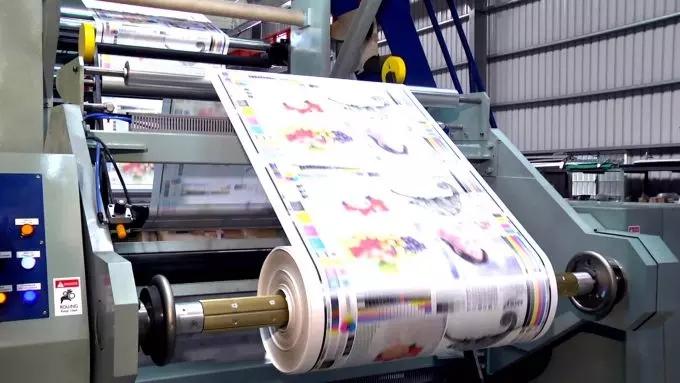

I was also a vic�m, I stopped prin�ng work some�mes ago and started working at a auto-mobile alignment and wheel balancing company in Agege, which I earn
company am working with are also facing hard �me in their business and they don't quit because of it, if they do not endure , I cannot be working with them now… so I decided to go back to my prin�ng business with prayer, then I discover I need to upgrade myself cause prin�ng business has upgraded, they are new machines I need to get familiar with. So I humble myself and start all over again. By God's grace,hereIamtoday Mr. Raphael, CEO Solu�ons prints concept made his opinion known about the topic 'echoes of hard �me in Nigeria prin�ng industry during a face to face interview session with himatMushinprin�ngarea.
Ques�on: what effect does the hard �me in Nigeria have on prin�ng business?
other place as we are known for the sale of prin�ng materials and increase in price of this materials is affec�ng our business seriously. The increase start from the manufacturer and then here in market , since materials cost increases, it is certain hat prin�ng price will also increase but unfortunately our customers are not knowing that, they'll refuse to accept the increase in price , which leads to low patronage and reduc�on in sales. Imagine I bought 2 drums of paint for 200,000 last month, ge�ng to know that it's now 240,000 now. TherearesomematerialsIneedto buy as soon as possible cause those materials will soon add up price, imagine ge�ng a material for 9200 now it's 10000. So manufacturer should always no�fy us of the incensement in price of the materials cause we're running loss on jobs, since we've no choice than to buy, give thanks toGodevery�me.


may find it difficult to learn the same task due to his age. This is exampleforanindividualhazard.
When it comes to Psychology it is the same process that has to be appliedtophysicalissues.
Bo t h p h y s i c a l a n d psychological challenges faced by employees in your workplace have to be equally well managed. While employers take ac�ons to control physical issues they somewhat tend to neglect the psychological aspects. However, it is important to understand that to make the workplaceapleasantplace,where your employees can work happily, i t s h o u l d b e f r e e f r o m psychological hazards also Psychology should be given its due a�en�on.
W h a t i s a p sy c h o l o g i c a l challenge?
It is the tendency for a person to get psychologically injured when exposed to a hazard or a stressful situa�on. Although stress is not a p s y c h o l o g i c a l i n j u r y, i f experienced in excess or for a
considerable period of �me it can leadtopsychologicalinjury
Howitcanaffectyourorganiza�on
Due to psychological challenges it is not only the individual employee that suffers, but it can affect your organiza�on badly. It can cause unplanned absence, higher staff turnover, poor performance etc. etc.
A n e m p l o y e e m a y f a c e environmental, organiza�onal or individual hazards in his workplace. Insufficient ven�la�on and sound pollu�on are examples for e n v i r o n m e n t a l h a z a r d s
Harassment, lack of mo�va�on and poor communica�on are among the many organiza�onal issues experienced. And psychological challenges may differ from person to person. A young person may quickly learn while an older person
In order to do this, you should get the opinions of the employees by discussing the psychological challenges with them on a regular basis You also should pay a�en�ontocomplaintsofthestaff members and their absenteeism etc.
The next step is to assess and priori�zethechallenges. Nowyou know the risks and it is �me to see which hazards should be given priority. Which hazards are likely to cause more harm? Is it a major dispute among two groups of e m p l o y e e s o r a m i n o r disagreement between two colleagues? Obviously, here you
G
have to give priority to the first case.
Also, if an issue has been present for a long period of �me it has to be taken care of without further delay
It is your responsibility to e l i m i n a t e o r r e d u c e t h e psychological risks as far as possible. And when doing so you willneedtouseamixofcontrols.
‘The Hierarchy of Risk Controls' says that coun�ng on people's behavior has to be the last resort. SafeWorkAustraliapointsoutthat “the aim (for control measures) is to achieve the best fit between working environment, the systems of work and the needs andcapabili�esofworkers.”

You can improve the quality of your workplace by following the measuresgivenbelow:
Install be�er ven�la�on, increase ligh�ng where necessary, have sound proof rooms, replace or repairdamagedmachinery
To reduce stress due to work overload
Discuss with workers before
assigning a new task, higher addi�onal staff if required, extend deadlineswhereneeded
Introduce policies and procedures for office behavior Provide a system toreportmisappropriatebehavior.
To clarify procedures, a new task etc.
Have an induc�on program for new
stopping psychological hazards in your workplace It is equally important to monitor and review them on a regular basis to make surethattheyareeffec�ve. When talking about psychology you have to consider the fact that it is less obvious than something physical. That is the reason why you should pay even more a�en�on to psychological challenges than physical challenges. If you review the measures regularly you can prevent psychological injury by elimina�ng the cause before it harmstheindividualconcerned.
The best method to find out an ongoing psychological challenge is communica�on with your workforce. Each employee is important to an organiza�on to run smoothly and he should be mentally and physically fit to carry out his du�es well. So, you should

comers, have training programs, make a senior staff member availableforguidance
It is not enough to make and implement new measures for
avoid any hazards as far as possible for the sake of the organiza�on as well as the people who are working in it. As the saying goes 'preven�on is be�er thancure'.
M A N A G E M E N PT T
‘In spite of the enormous quality and growing prin�ng industry in Nigeria, over 70 percent of prin�ng jobs by Nigerians are executedoverseas’
Job flight has been one of the major challenges facing the Nigeria prin�ng industry. No doubt, this challenge has eaten into different aspects of the en�re printvaluechain.
The constant declining state of the industry is one of the major concerns for stakeholders in the Nigeria print sector and every prac��oner has their own from thesechallenges.


It's no longer news that print jobs flight, high cost of print equipment and consumables, quackery, dearth of experts, infrastructural decay, just to men�on a few are s o m e o f t h e c h a l l e n g e s incapacita�ngthesectorlocally
Professional Printers in Nigeria are raising fresh concerns over a disturbing phenomenon They allege that print and retail packaging and labelling jobs, which Nigerian firms have capacity

to handle, are being outsourced to foreign companies and shipped back into the country through the variousentryports.
It was in furtherance of the aforemen�oned goal that past administra�ons, over the years, put in place and upheld policies and legisla�onstodiscouragepatronage of foreign goods and services for materialsthatcanbesourcelocally.
It is unarguable that Nigeria prin�ng and publishing industry is grappling with issues of local capacity development and globaliza�on. As developed na�ons adopt digital innova�ons to modify their business models in the area of prin�ng to take advantage of globaliza�on, it is not clear what prac��oners in the Nigeria prin�ng sector are doing to enable them compete favorably in the same globalmarket.
Moreover, as Indians and South
Africans invest in the Nigerian prints market, offering services and products enhanced with digitalinnova�ons,itisparamount that an assessment of the local prin�ng sector be undertaken to assess how the printers are adjus�ng to the challenges posed by capacity development and globaliza�on.
To develop Nigeria prin�ng industry capacity, Government needstobemoreproac�veanddo things that will trigger posi�ve change. For instance, paper alone is a three trillion-naira industry, yet we have never in Nigeria used primary raw materials to produce paper All we have been using is either pulp or secondary raw materials A lot of people in Nigeria are now conduc�ng research, but there is no single laboratory where the research can bedone.
One would expect that a CBN governor would be dona�ng a
laboratory that will aid research because if we succeed in producing paper locally, a lot of burdenwillbetakenoffthenaira.
Prin�ng in a depressed economy requiresanurgenta�en�on. T h e p r i n t a n d g r a p h i c communica�on industry can join forces with the government to create a desired vibrant print and graphic communica�ons sector that will aid the crea�on of job opportuni�es in line with the Economic Recovery Growth programme of the Federal Government.
Print is part of everyday life. All that needs to be done is to go into the nearest store to buy any item. You iden�fy the cereal, detergent or just about anything you want to buy by the packaging of the item. Print products in the same way holds sway in educa�on sector

since they are the fundamental tools that are used to pass on knowledge. You can carry this argument prac�cally through virtually every sphere of life; pharmaceu�cals, postage and courier services, signage just to men�on a few. The Print and graphics communica�ons sector can therefore be said to be an important partner to every other sector, service or industrial. Smithers Pira es�mates the global print sector to top USD980 Billion in 2018. The poten�al therefore in this sector is tremendous and Government can only ignore this sectoratitsdetriment. For the purpose of this ar�cle, we would highlight three areas of focus for the prin�ng industry on the one handandgovernmentontheother.
Firstly, the industry must have lobby groups like the Poli�cal Ac�on Commi�ee (PrintPAC) of the Prin�ng Industries of America whose role is impac�ng public policy direc�on and debate pertaining to issues affec�ng p r i n � n g a n d g r a p h i c communica�ons companies. This advocacy unit will ensure that
resources are dedicated to building and maintaining solid rela�onships with and con�nually educa�ng government about the challenges and opportuni�es facingtheindustry.
Secondly, the industry must encourage longer-term contracts (where this applies) with their corresponding service level agreements between industry players and clientele including government What currently is prevalent is that most print concerns cannot guarantee if they would get the next order from an organiza�on. This does not allow planning, encourage further investment or engender the economies of scale that would allow the jobs be delivered more efficientlyandaffordable.
Thirdly, the industry must collaborate with the requisite organiza�ons and bodies in the area of print educa�on and print leadership to improve the quality of the print entrepreneur and human capital in the industry. This collabora�on must also focus on the next genera�on in order to create the required interest and inflow of human capital into the industry.
Government on its part should consider implemen�ng the following:
Focus on the industry in the same wayit'sfocusingonoil. The investment required to get some of the cons�tuent sectors of the industry back off the ground are humongous A large scale chemical pulp (paper) mill with an annual pulp produc�on of around 1.4 million tons has an investment cost of about 2.5 billion USD if built from the ground up. (iea.org). Government can partner with the private sector by crea�ng an enabling environment for investment in paper mills of various capaci�es. (Nigeria imported 1.2M tonnes of various
paper and paper products last year). The print sector must be i n c l u d e d i n t h e F e d e r a l Government plans for its Strategic Economic zones and free trade zones.
As part of its focus on Educa�on, Government must work with the industry to improve the quality which students are being educated on prin�ng and graphics c o m m u n i c a � o n s i n i t s u n i v e r s i � e s , c o l l e g e s o f technology and voca�onal schools.
Mr Olugbemi Malomo is the reelected president and chairmanin council of the Chartered Ins�tute of Professional Printers of Nigeria has been so passionate about the campaign to keep Nigerian prin�ng jobs in Nigeria, recently he shares his view on ways of strengthening the local prin�ng industry and insinuate why INEC should print 2023 elec�onballotpaperlocally.
He said “INEC has absolutely no reason to patronise por�olio contractors, par�cularly for what can be done in Nigeria. The elec�on is for the benefit of Nigerians. We have an astute Nigerian professor as the umpire, we are going to elect a Nigerian as president, why should we choose a foreigner to print our ballot p a p e r a � e r 6 0 y e a r s o f independence? So, why are Nigerian printers being denied their own dividends of democracy when they have the capacity to do so?
“By the law that set up CIPPON, nobody can prac�se or earn income from prin�ng without being registered by us. What we are saying is that INEC should obey the law. Por�olio contractors or brokers, if they must operate, should partner with local printers
to print ballot papers in Nigeria. That's the only middle point or compromise acceptable to us. We willcallthemoutbywayofli�ga�on ifwemust,anyonenotregisteredby the ins�tute that is awarded ballot papercontracts”
“There are over 70 million voters across board and that is about 350 million ballot papers for the general elec�ons within four to five weeks. Ifwehavesixmonthstotheelec�on and are awarded the contract, I can tell you authorita�vely that some of our members can print over 10 million ballot papers in a week, some 5 million in a week, some others can do one million copies in a week. The onus is now on INEC to prequalify more across the geopoli�cal zones of Nigeria. Going to print ballot paper abroad at a period the global supply chain is challenged will certainly not addressthelogis�cproblem”
“ G o v e r n m e n t s h o u l d t a ke responsibility and must be deliberate about empowering Nigerians. We acknowledge the fact that the chairman has elec�ons to conduct, we acknowledge the fact that all of us should help him to conduct very successful elec�ons and we should do what is scien�fic and prac�cable. The people taking those jobs abroad are not printers but mere contractors who don't employ anybody nor buy diesel; they are por�olio contractors, and we should ask ques�ons if those peopleareghosts”

A quick check on the prin�ng and industry reveals that in the seven�es and eigh�es, the Nigeria prin�ng industry was the hub of prin�ng in West Africa. According to Malomo, “I can recall vividly how peoplefromFrancophonecountries
came to Shomolu (a suburb in Lagos State, South-West Nigeria) to print their French text books. But because successive Nigerian government had undermined this i n d u st r y a n d ca re l e s s o n safeguard her, that this sector and her poten�als have suffered grave andcon�nuousdecline”.
An understanding of the prin�ng industry globally shows that it's a means of job crea�on. In the United States, the sector is the third highest employer of labour, employing more people than the automobile industry Similarly in Europe, the prin�ng sector is a m o n g t h e t h re e h i g h e st employers of labour. In Nigeria it is the second largest employer of labour a�er tradi�onal farming, yet it maintains such a low profile that rather than being a great giant,itcouldjustaboutdisappear from sight. It is a diverse, disperse swarm of small businesses employingaslowasfivepeople.
“However, its great strength when examined holis�cally shows one is faced with an en�rely different monster comprising of thousands of small independent units”, added Malomo. Prin�ng touches lives constantly in the form of product packages, books, newspapers, magazines, office sta�onery and a wide variety of other printed items we use every day. We consume it without thinking about it. As further argued by Malomo, “to treat prin�ng as a stand-alone product, service, or process, is impossible. It is a manufacturing industry in the strictest sense but it is also a serviceindustry”
The chief execu�ve officer of AKFAR prin�ng and publishing limited, Dr. Mrs. Adesola Falaiye's charitable personal life revealed as she passionately shares her story on her love for golf; simply a charity drive to raise funds for the needy- helpless Paediatric Cancer pa�ents.

However, Dr. Falaiye's personal passion for golf sport brings about the ini�a�on and birth of 'The

These are a special class of humanity for which the tournament debuted in December 6, 2020 Yet, golfers will always be players, as the par�cipants in the second edi�on of the event displayed their talentsandskillsonthecourseonthefinalday
The Lions Club, of which Dr. Adesola Falaiye is a prominentmember,playedahugeroleinthesuccess
FOR THE LOVE OF GOLF… THE CHARITABLE SIDE OF DR. FALAIYE YOU DON'T KNOW
oftheevent,evenastheyalsohada round on the course. But most importantly, this charity event lived up to expecta�ons when it went beyond dona�ng items for the Paediatric Cancer Ward of Lagos University Teaching Hospital (LUTH) to adding des�tute from Orphanage home, Tripple G, also in Lagos,tothelist.
According to Mr Ayo Aderiwale, an industrialist based in Lagos, said, 'having people like Dr. Falaiye, who ini�ated For The Love Of Golf C h a r i t y To u r n a m e n t , w h o remember their history and give back to the society that made them as giving to the needy is cultural in Africa.
He added, “Falaiye is a leader with rich cultural background,whotakesposi�veadvantageofitforthe good of the society. He reaches out to those who definitely cannot pay back and it is a welcome development that everyone, who cares for the needy, shouldsupport.”
Busola Ladipo,theladyViceCaptainof IkejaGolfClub, also applauded Falaiye, saying: “This second edi�on of For The Love Of Golf Charity Tournament is a huge success; it's an improvement on the first edi�on, which goes to show that the organisers have done their home work properly for what the event stands for.”
Ladipo said “I'll advise the organisers, ledfurther that by Dr Falaiye, concentrate on the Paediatric Cancer pa�ents they started with. It will help them to be more focused and achieve be�er results without distrac�on.”
Joy Ayonote also shared the same sen�ment, describing Falaiye as an outstanding personality with averyposi�vedrive.
She urged corporate bodies to support the ini�a�ve to build a be�erplacefor the needy,adding,“Carefor those afflicted with cancer should not be a yearly affair; it should be at regular intervals, at least quarterly because the disease can be terminal and thetreatmentisdamnexpensive. “This is why the ini�a�ve by Dr Falaiye becomes very impera�ve for everyone to support it. I also believe that support can come by way of providing logis�cs, manpower; trained personnel for the hospitals to be well equipped, rather than giving only money for buyingofjustdrugs.”

An excerpts from one-o-one interview session with the Brandberg boss Mr Ayodeji Ogundare, the head of opera�on of Brandberg solu�ons has disclose the recent challenges facing Nigeria print industry and the needs to bring Nigeria print jobsbackhome.

Q: In research, we learnt that Brandbergisopera�nginprin�ng and branding only but lately now grooming as a media company too, so how long have you been in prin�ngindustry?
A: We've been in opera�on since 2020, we're just 2 years in the industry, I'm not the pioneer, I was invited to come and s�r it up and createmorevaluetothecompany.


A: Me personally have been into
prin�ng since 2 0 0 4 , i t ' s interes�ng and s�ll evolving and c h a n g e i s c o n s t a n t i n prin�ng, when I s t a r t e d p r i n t business, it was o n l y m u s h i n , S h o m o l u a n d Ogba that are dominant print hub but the fact is that Shomolu is n u m b e r o n e when it comes to prin�ng.
Q: What are the recent challenges f a c i n g p r i n t b u s i n e s s i n Nigeria?
A: Government is the cause of the whole challenges, our government taking print business abroad is affec�ng the industry so bad, for example the universal basic educa�on sectors makes it compulsory for every student to haveatleast5 booksforthemselves and the minimum price of prin�ng a notebook is #500, so instead of them to give it to us locally it's printed abroad, research shows that there are 22 millions students out of school in Nigeria, so let me juxtapose it 22millions �mes 500 �mes5 books ,you knowhowmuch it is, if all this jobs are given to us to do locally it won't only boost the economy but also develop the sector and na�on at large. I could recollect when I was in secondary school back then in 1997 by then we have 400 schools in Lagos here, if you mul�ply the total number of books for student by then by the
amount for prin�ng, it'll always be a plus for Nigeria economy, also prin�ng of ballot paper abroad is really affec�ng the industry and economy, those are wat we can easily do locally and benefits our na�on. The reason why Nigeria is experiencing the current issue of high dollar rate is because Nigeria is not an export dependent c o m p a n y, w e ' r e i m p o r t dependent company, so when we take those jobs abroad, we're killing our naira and empowering thosepeoplethere.
Colour plays a crucial role in graphic design and print produc�on at large, as does the psychology of how humans perceive colour. Here is a look at the ways that colour and psychologyaffectthegraphicdesignprocess.


Colour psychology is the study of how colours determine human emo�ons and behaviours. We react to colours based on a complex series of interac�ons between our personal tastes, our familyupbringing,andourculturalbackground.
Colour can affect percep�ons in subtle ways; for example, it can enhance or detract from the way that food tastes. The right colors can even enhance
responses from customers, and this is part of the graphicdesigner'sgoal.
Great graphic design also an�cipates cultural differences in the way colours are perceived. The same colour can mean very different things to different audiences; for example, in most cultures yellow has a bright, cheerful connota�on, but in China it may have vulgar or adult connota�ons. In the US white symbolizes purity and is o�en used for bridal branding, but white is a mourning color in Japan, India, China, Korea, and the Middle East. The bo�om line here is to know your audience and choosewisely.
how effec�ve pills and placebos are; blue is used for calming or sleep-inducing pills whereas red or yellow areusuallyusedfors�mulants.
Every brand and business use colours deliberately in their product designs, packaging, adver�sements, and websites. High-level graphic design relies in part on the ability to select colours that work with the brand and the company's mission. The psychology of color can and must be use to trigger the right

irect-to-garmentprin�ng(DTG)isaprocess
Dof prin�ng on tex�les using specialized aqueous ink jet technology. DTG printers typically have a platen designed to hold the garment in a fixed posi�on, and the printer inks are je�ed or sprayed onto the tex�le by the print head DTG typically requires that the garment be pre-treated withaPTMorPre-treatmentmachineallowingforthe following:
· Stronger bond between garment fibers and thepigmentedinks
· Lays down loose fibers to provide for a smoothersubstrate
· Chemically reacts with the inks to promote dryingandcuring
Since this is a digital process, the print is sharper and has a higher resolu�on, or DPI, than tradi�onal prin�ng methods such as screen prin�ng. However, unlike screen prin�ng, there is no long setup or cleanup process, and DTG has the ability to print just one singleshirtforminimalcost.

DTG printers use aqueous tex�le inks (water-based chemistry) that require a unique curing process. Since D2 inks are water-based, they work best for prin�ng on natural fibers such as co�on, bamboo, hemp, and linen.Inaddi�on,pre-treatmentistypicallyappliedto the garment before prin�ng. The pre-treatment is heat-pressedintothecustomt-shirtcausingthefibers oftheshirttolaydown.Thepre-treatmentalsoallows the water based inks to bond more fully to the garment. This is especially important when using whiteinkondarkgarments.
Once the custom garment for instance a t-shirt- has been properly pre-treated, the shirt (or garment) is then posi�oned onto a pla�en system designed to hold the shirt in place. The shirt is then digitally printedaccordingtothedesignintheprinterqueue. Direct-to-garment prin�ng in the United States began in1996withtheintroduc�onofthefirstcommercially availableDTG printer named "Revolu�on", developed by DIS of Bradenton, Florida, and based on an inven�on of Ma�hew Rhome. Rhome had been working on the DTG project for some years and applied for a patent in July 1996. This patent was grantedbytheUSpatentofficeinAugust2000making
itthefirstDTGpatent. The Revolu�on printer was offered for sale un�l 1998 when Rhome le� the company to start development ofthefirstBrotherDTGprinter,whichcametomarket in2005.
A�er the release of the Revolu�on printer, there was a lot of development but not much sales ac�vity in the market un�l 2004 when Mimaki introduced their printer at the ISS show in Chicago, Illinois and, later that year, when kornit and US Screen displayed their offerings at the SGIA show in Minneapolis, Minnesota. In 2005, at the ISS Atlan�c City show, Brother Interna�onal introduced the GT 541 Garment Printer to the market making it the first “ground up” DTG printer offered. This printer had print heads, ink, and electronics developed specificallyforDTGprin�ng.
At the Chicago PRINT 2013 show Epson introduced the F2000 printer. The release of this printer was notable as it addressed many of the issues prevalent in DTG prin�ng at the �me. One of the most important features of the Epson F2000 was its ink set as it had a two-year shelf life and did not have the se�ling or clogging issues of previously introduced DTGinks.
By May 2019, the North American DTG market was currently valued at over $2.5 billion with a compound annualgrowthrateof10.5%through2021.
Providing inline finishing capabili�es lets you increase your profit margins on print jobs, whilst at the same �me shortening your own produc�on �mes, reducing labour costs, improving quality control, cu�ng back on waste and saving energy.
Tradi�onally viewed as an a�erthought and produc�on bo�leneck, finishing is now being viewed as a cri�cal stage in produc�on and a way to differen�ate products and create added value.It is not unusual for finishing to generate as much as 40% of produc�on costs, and for poor quality control at this stagetodestroyagreatdealofaddedvalue.
With updates in digital produc�on technology, SME printers have woken up to the fact that inves�ng rela�vely modest sums in finishing equipment can lead to significant produc�vity improvements and reduce costs. Results from a recent drupe global trend report show that 48% of respondents were planning toinvestinfinishingequipment,and40%areinves�ng
todriveefficiencyimprovements.
Digital inline finishing features a variety of different workflows. These are all about automa�on, making in line and near line equipment cri�cal, but some�mes an offline approach will be more applicable.
So how should you be inves�ng? In inline finishing, the press and inline finishing equipment are directly connected and closely integrated using front-end management controls. This is the solu�on for you if you produce a defined range of products in standard formats such as s�tched booklets, reports, calendars and book blocks. The overall produc�vity of a digital press with in-line finishing capability is determined by the speed and efficiency of the finishing components, so it is essen�al that these don't detract from the ratedspeedofthedigitalpress.
An offline finishing workflowis more common when a printer has a range of digital and offset equipment,

but this increases labour costs. Some�mes the higher speed of off-line finishing equipment will more than compensate for the increased operator inven�on. It all depends on the type and quan�ty of jobs you need tofinish.
In contrast to in-line and off-line, near-line offers greater flexibility. There is no physical connec�on between equipment in this case, but the finishing line knows the requirements of each job, from OMR (op�cal mark recogni�on) technology or from a direct interface with the press's print server, through JDF This enables the finishing line to manage the printed output from a variety of presses and create an audit trail, which is cri�cal to personalized products like mailshotsortransac�onaldocuments.
Choosing the right finishing workflow will depend on understanding not only your workload, but also how you can apply different finishing solu�ons to improve efficiencies and add value through new products. However, one major benefit that has been largely overlooked by the printer and has not been sold effec�velytothecustomerisinlinefinishing.
Inline finishing is the process of bringing services such as folding, saddle s�tching, side s�tching, case binding, punching and other post-processes in-line, so they are accomplished at the same �me as the prin�ng. A wide array of finishing equipment is now
Inline finishing in the print industry gives you benefits including:
• Labour-intensive post-processing completed at same�measprin�ng.
• One pass produc�on of high page count materials.

• Flawless binding, free of missing pages and imperfectcolla�on
Inline Finishing means your customers will benefit from already finished print products, shorter produc�on deadlines for more complex print products and a 'one-stop shop' offering everything fromasinglesource.
available to be connected directly to digital produc�onprinterstoachievethis,
Providing these services in-line not only saves on labourcosts;italsopreventsmissingpages,imperfect colla�on, and other common mishaps. It makes prin�ng extremely small lots possible – even a single copy – and extends the range of just-in-�me services from fliers to catalogues, manuals and other high page-countprojects.
For smaller printers and in-house print departments, reducing the amount of work that is outsourced gives greater produc�on flexibility and control. (A good example of this are W2P systems, providing a steady but unpredictable flow of digital short run on demand jobs, which cannot be outsourced and have tobecompletedin-house.)
Essen�ally, the more aspects of a print job you can control internally and offer on-demand, the greater your growth will be and the more customer loyalty youwillgenerate.







